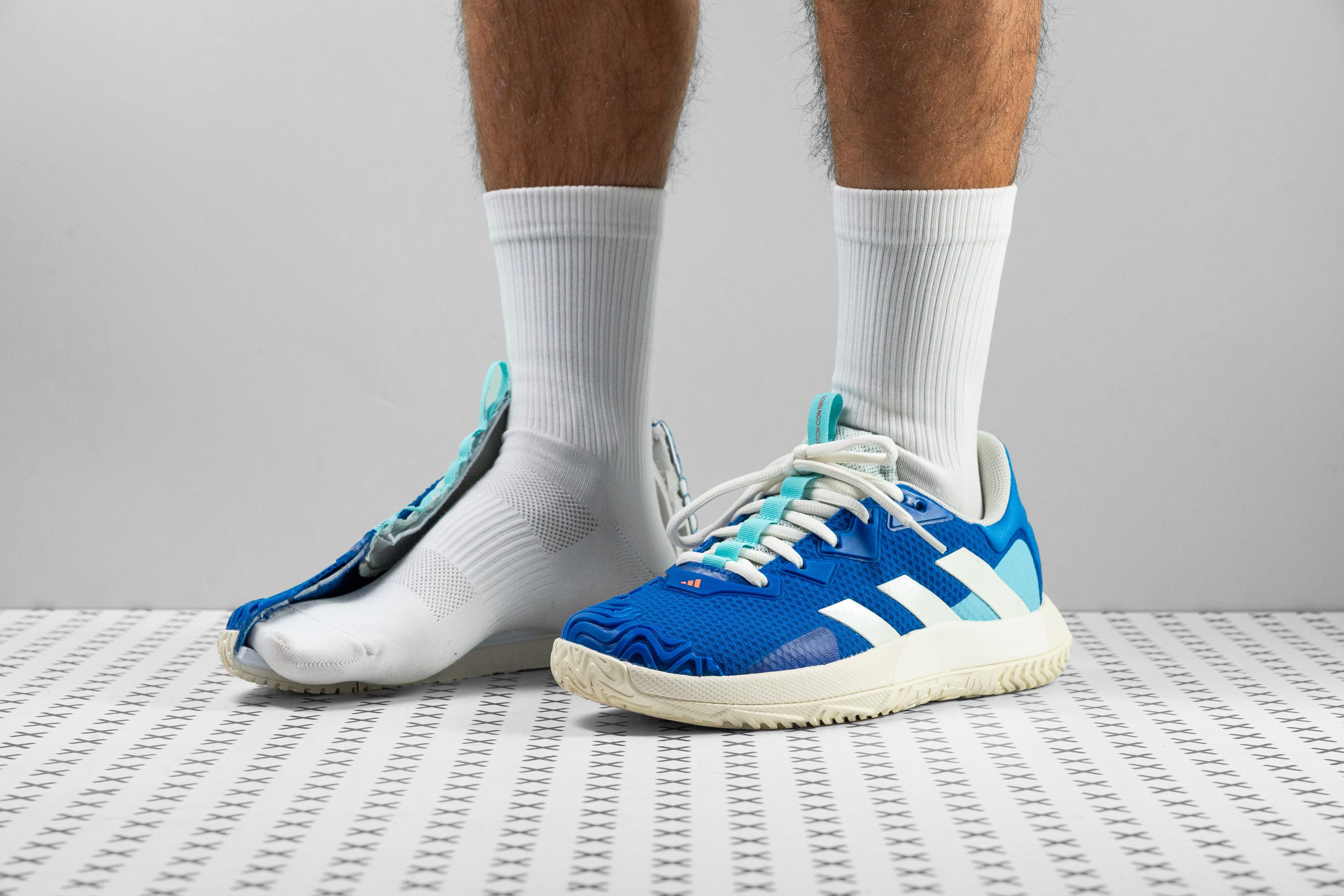Our verdict
Pros
- Lighter than average
- Very good ground feel
- Great impact protection
- Springy Bounce cushioning
- Responsive insole
- Comfortably flexible
- Stable platform for a speed shoe
- Exceptionally durable upper and outsole
- Incredibly grippy
- Good for wide feet
Cons
- Not so breathable
- No snappy push-offs (no shank)
- Not for narrow feet
Audience verdict
- Top 15% in hard court tennis shoes
- Top 10% in Adidas tennis shoes
Comparison
The most similar tennis shoes compared
+ + Add a shoe | |||||
|---|---|---|---|---|---|
| Audience score | 90 Superb! | 82 Good! | 86 Great! | 88 Great! | |
| Price | $120 | $90 | $120 | $160 | |
| Shoe type | All CourtHard Court | All CourtHard Court | All CourtHard Court | All CourtHard Court | |
| Shock absorption | High | Low | High | Moderate | |
| Energy return | Moderate | High | Low | Low | |
| Traction | Moderate | Moderate | Moderate | High | |
| Construction | Speed | Speed | Speed | Stability | |
| Breathability | Moderate | Breathable | Moderate | Moderate | |
| Weight lab | 12.1 oz / 343g | 11.9 oz / 336g | 12.2 oz / 347g | 13.9 oz / 394g | |
| Lightweight | ✓ | ✓ | ✓ | ✗ | |
| Drop lab | 9.4 mm | 11.2 mm | 11.8 mm | 11.3 mm | |
| Width / fit | Medium | Medium | Medium | Medium | |
| Toebox width | Medium | Wide | Medium | Medium | |
| Size | Slightly small | True to size | Slightly small | Slightly small | |
| Midsole softness | Balanced | Firm | Balanced | Balanced | |
| Stiffness | Flexible | Flexible | Flexible | Moderate | |
| Torsional rigidity | Stiff | Stiff | Moderate | Stiff | |
| Heel counter stiffness | Moderate | Moderate | Moderate | Stiff | |
| Midsole width - forefoot | Very wide | Wide | Average | Wide | |
| Midsole width - heel | Average | Wide | Average | Wide | |
| Outsole durability | Good | Good | Good | Decent | |
| Heel padding durability | Bad | Good | Good | Decent | |
| Heel stack lab | 26.7 mm | 26.7 mm | 28.8 mm | 28.4 mm | |
| Forefoot | 17.3 mm | 15.5 mm | 17.0 mm | 17.1 mm | |
| Insole thickness | Average | Very thin | Thick | Thick | |
| Removable insole | ✓ | ✓ | ✓ | ✓ | |
| Heel tab | None | None | Extended heel collar | Extended heel collar | |
| Toebox durability | Good | Good | Good | Decent | |
| Outsole hardness | Average | Average | Average | Average | |
| Outsole thickness | Thin | Average | Thin | Very thin | |
| Ranking | #7 Top 14% | #30 Bottom 28% | #17 Top 41% | #11 Top 27% | |
| Popularity | #34 Bottom 35% | #13 Top 31% | #25 Bottom 40% | #9 Top 22% |
Who should buy
After a series of demanding playtests and meticulous lab measurements, we have no doubts that the Adidas SoleMatch Control is an excellent option for:
- players who want light and nimble tennis footwear
- fast movers who want excellent grip and side-to-side confidence
- aggressive players who want all the upper reinforcement they can get
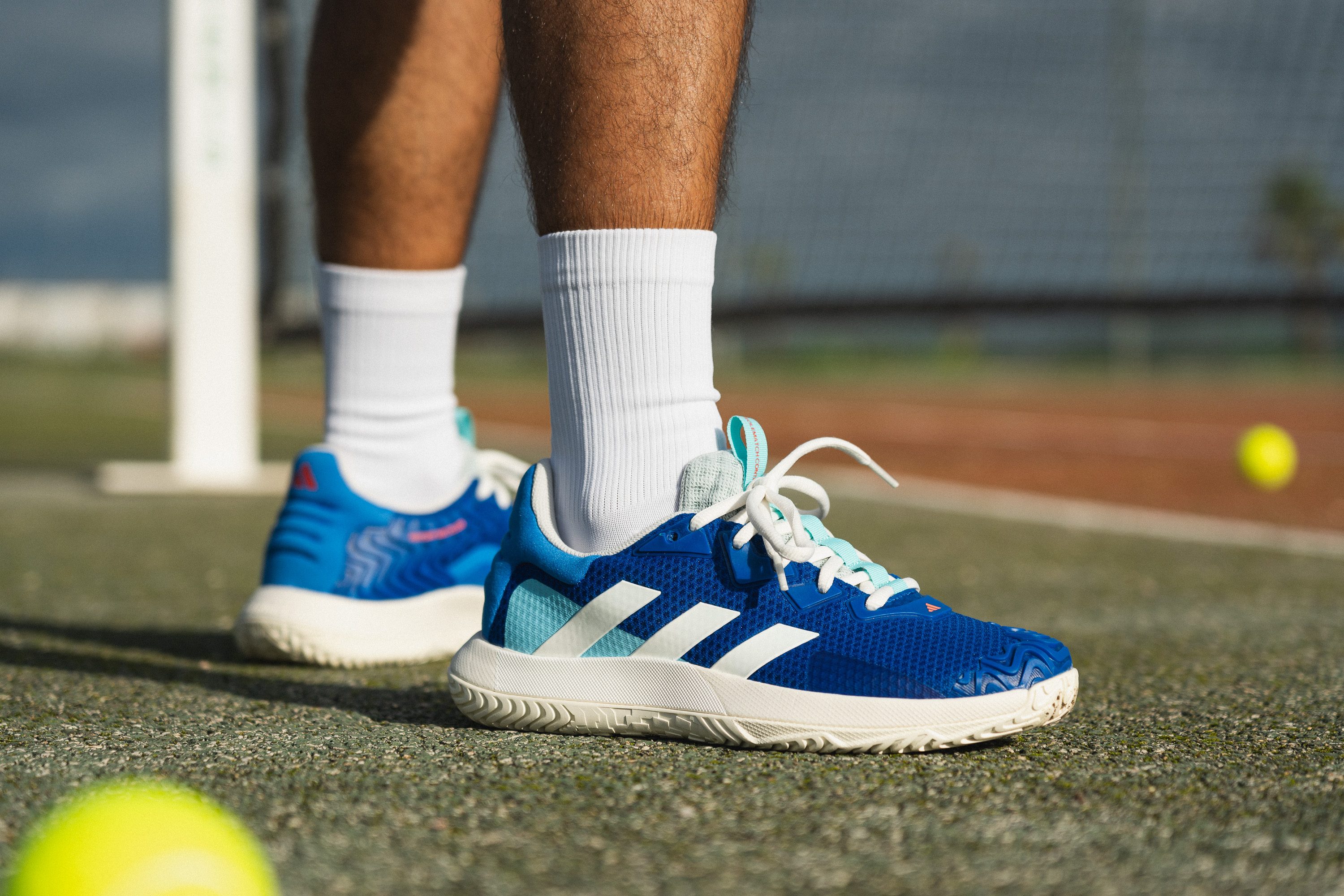
Who should NOT buy
When you want to enjoy a game of tennis but also survive a heatwave, you do need a more breathable shoe than the SoleMatch. One of our current top options for that is the ASICS Solution Speed FF 2.
This ASICS shoe is also a better option for those with narrow feet. Given the spaciousness of the SoleMatch Control, you may require a more close-fitting tennis shoe. The Nike Vapor Pro is another shoe on our minds.
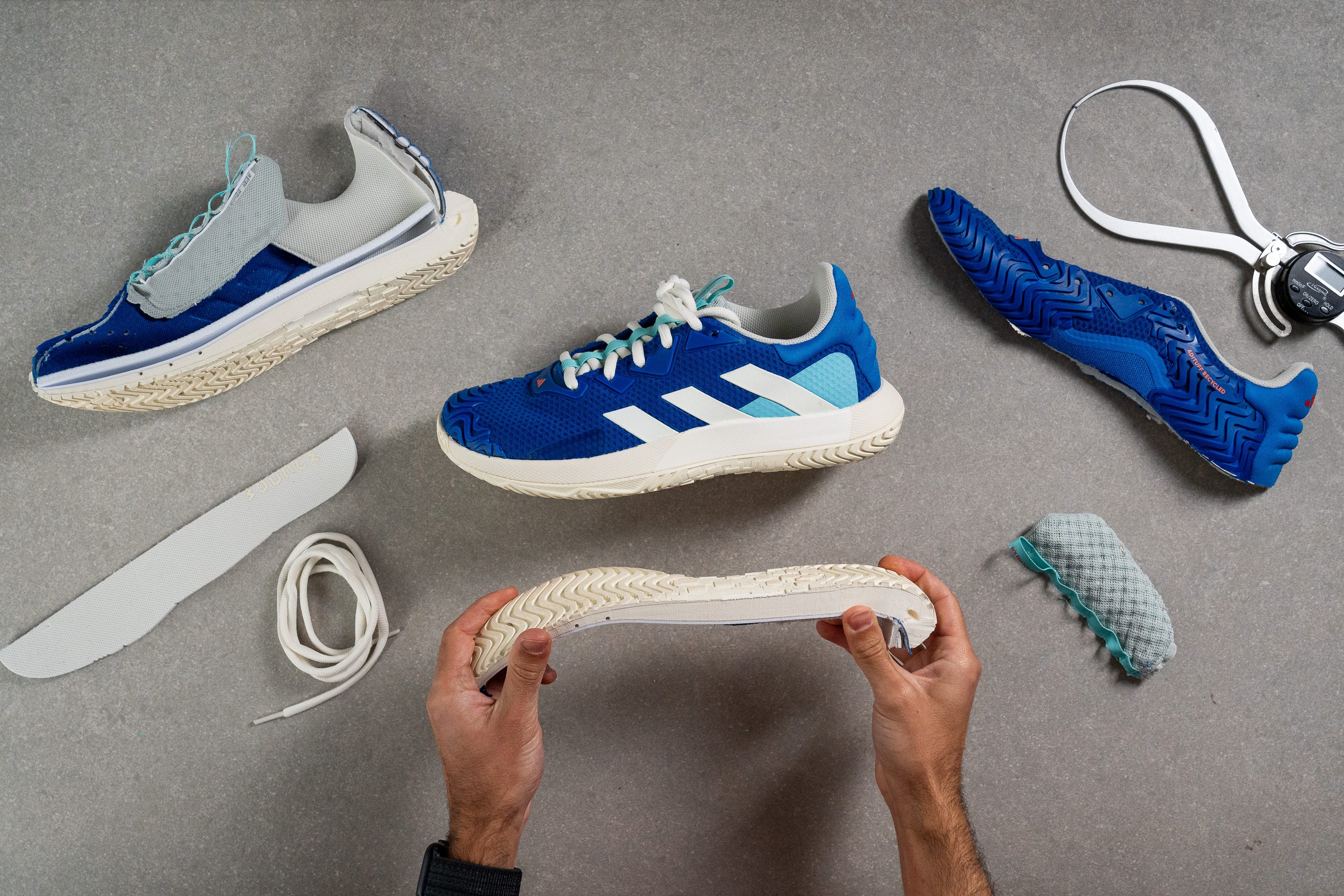
Cushioning
Shock absorption
Hard stops and sprints to the net feel comfortably supported with this Adidas shoe's solid cushioning.
The Solematch Control returned a standard shock absorption measurement of 64 SA in the forefoot but proved to be cushier than average at 106 SA in the heel. This makes the shoe comfortable for those longer rallies on hard court.
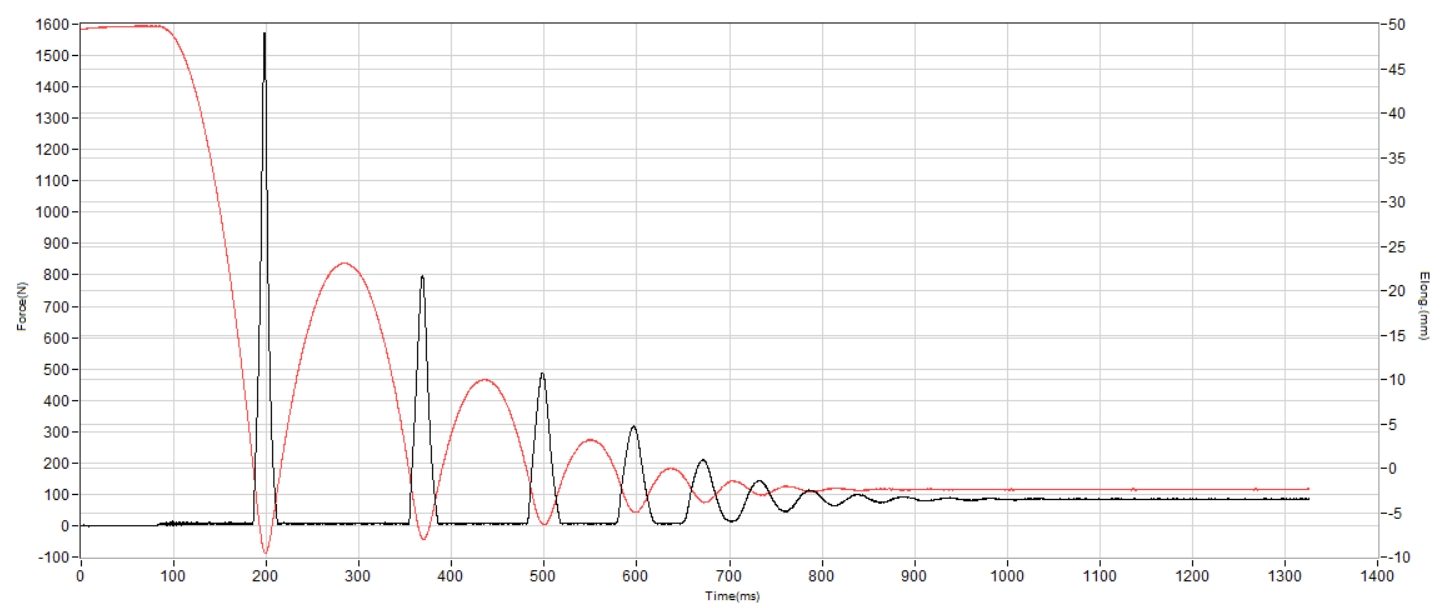
| Solematch Control | 106 SA |
| Average | 98 SA |
Energy return
The SoleMatch Control features a full-length Bounce foam with springy properties that match its name.
Our machine recorded a standard 48.4% of energy return in the shoe's heel and a slightly higher 52.1% in the forefoot. This translates into a moderately dynamic ride, which wasn't very explosive but made us feel power-efficient and quick on our feet.
| Solematch Control | 48.4% |
| Average | 48.4% |
Heel stack
Based on our caliper, the shoe's stack height comes in at 26.7 mm. That's a few millimeters lower than the average tennis shoe.
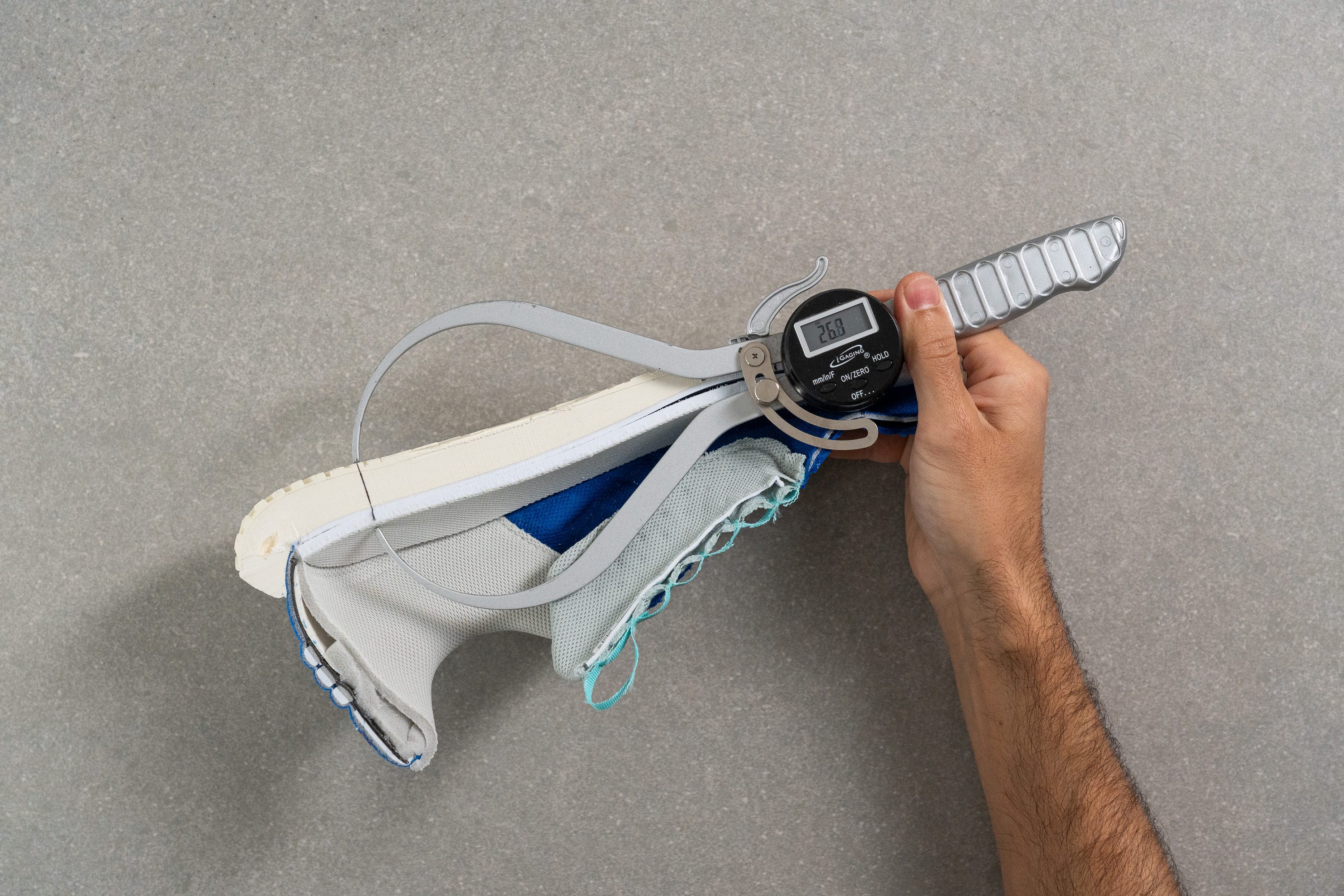
But at the same time, we never once felt like impact protection was missing in this Adidas shoe. Landings remained well cushioned and supported.
| Solematch Control | 26.7 mm |
| Average | 29.2 mm |
Forefoot stack
Similarly to the heel, the shoe's forefoot stack also comes in lower than the average at 17.3 mm. We felt the benefits of it specifically when pivoting and taking small adjustments with the foot.
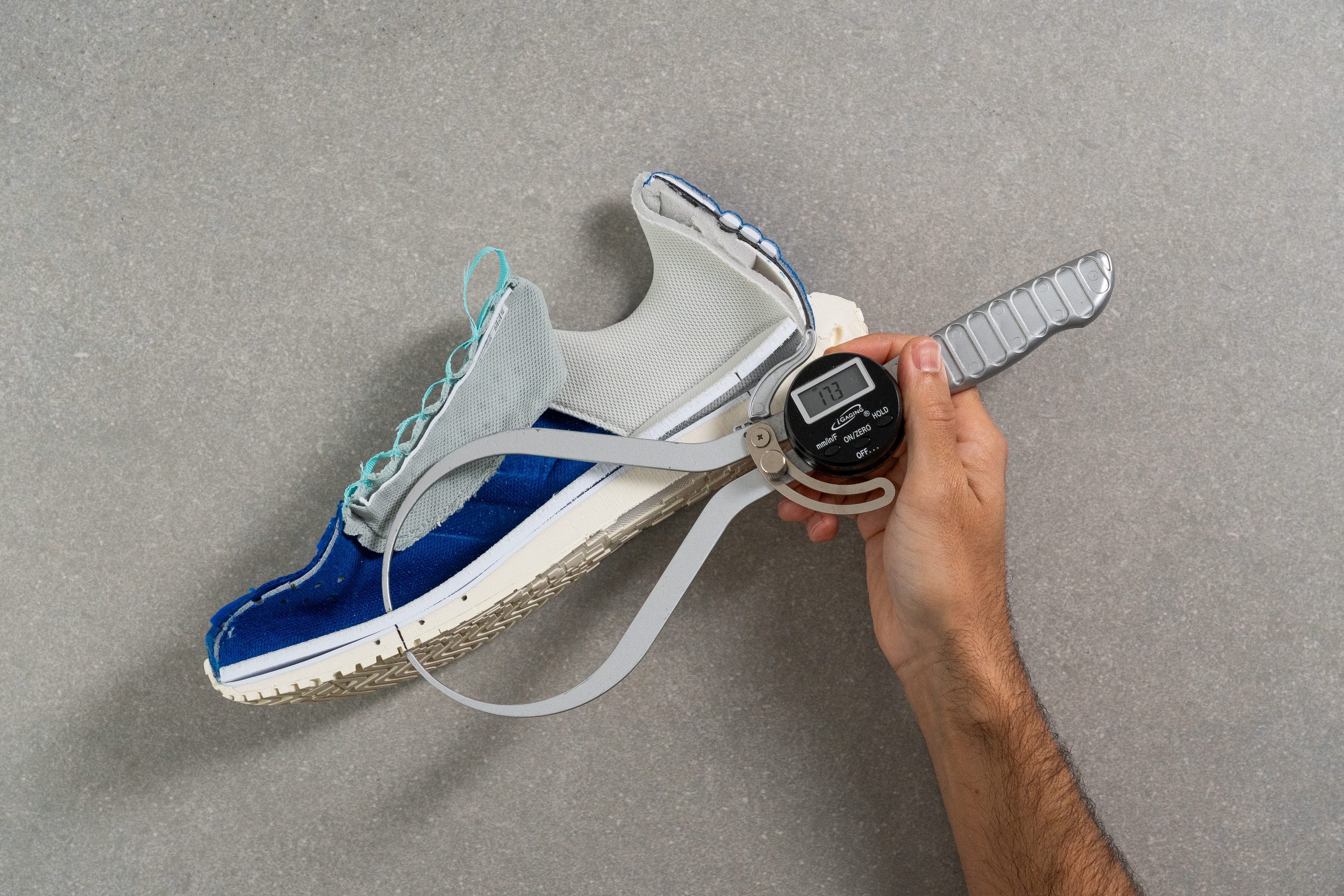
| Solematch Control | 17.3 mm |
| Average | 19.3 mm |
Drop
We found that the Adidas SoleMatch Control grants its rather intimate ground feel through a lower-than-average heel-to-toe drop. Checking the difference between the shoe's heel and forefoot stack heights, we got 9.4 mm.
Being on the lower end of tennis shoes, it indeed makes the shoe feel closer to the ground as the heel is not so elevated above the toes. It also makes for a more stable experience.
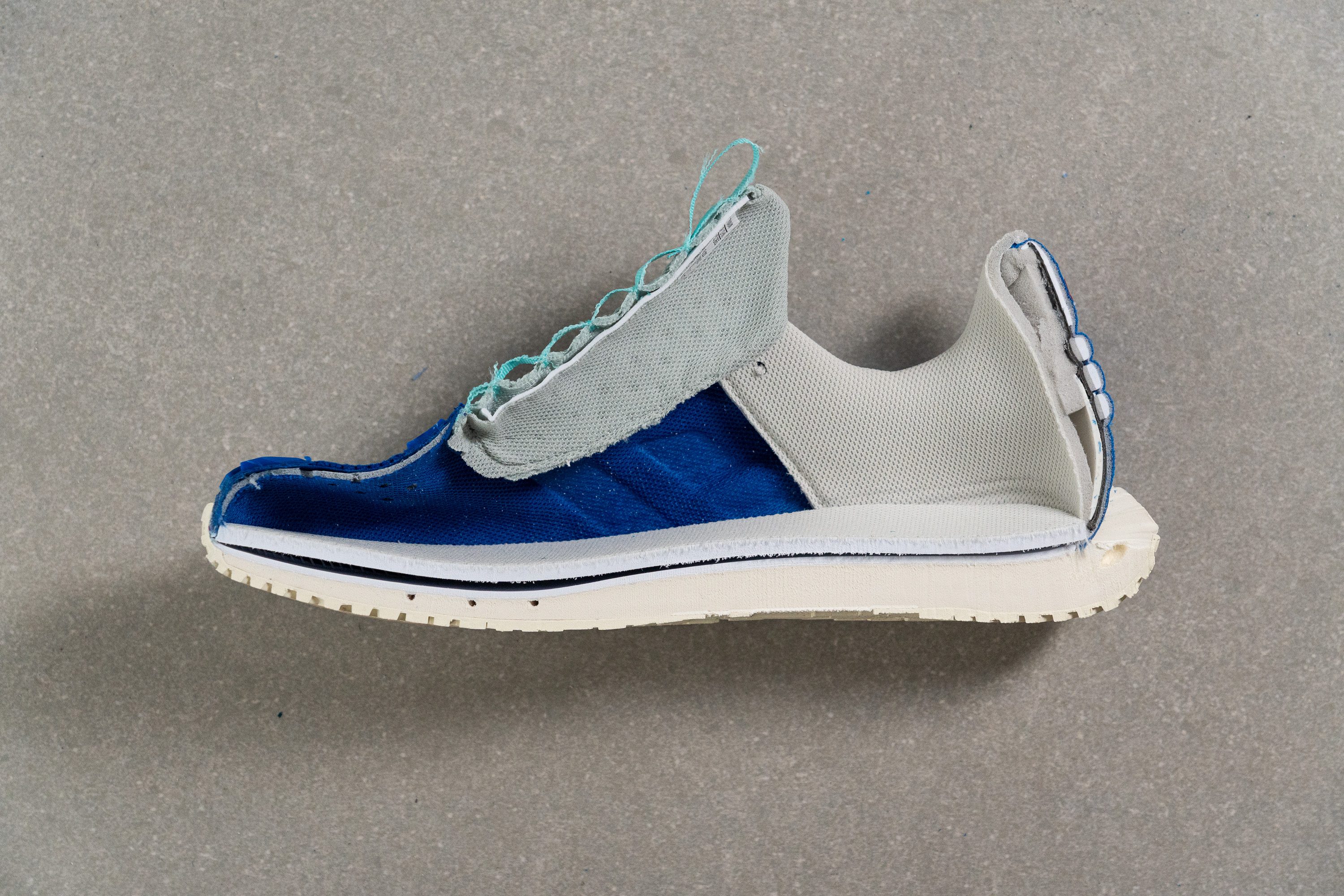
| Solematch Control | 9.4 mm |
| Average | 9.9 mm |
Midsole softness
Being slightly on the soft side, the Bounce foam treated our feet to its springy nature and great impact protection.
According to our durometer, this foam is at 24.0 HA which is an impressive 25% plusher than average. The only downside is that it tends to bottom out faster because of that too. And because it's the only foam used in the midsole of the SoleMatch Control, the joy of responsiveness will not last very long.
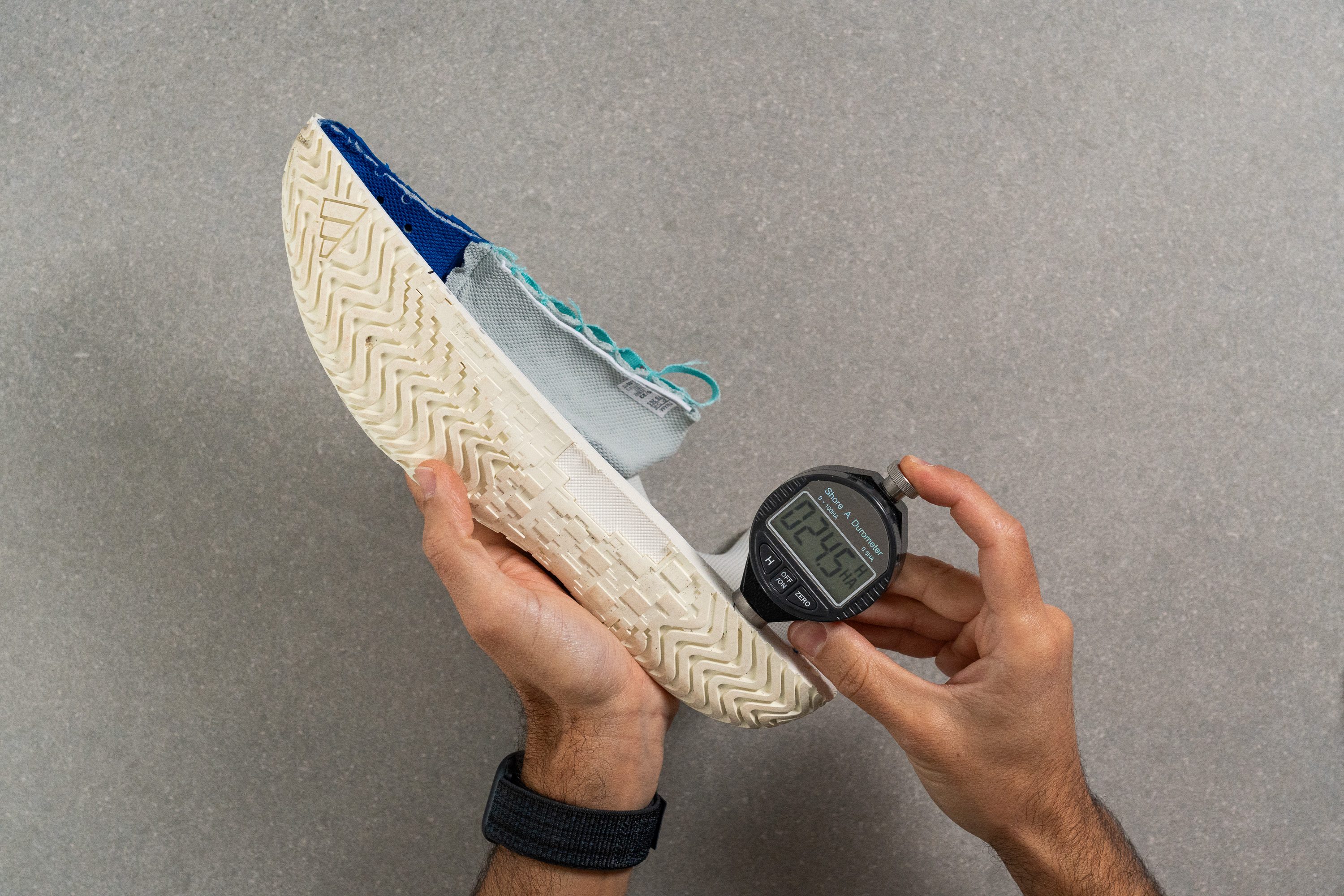
| Solematch Control | 24.0 HA |
| Average | 28.1 HA |
Size and fit
Size
Adidas Solematch Control fits slightly small (20 votes).
Internal length
| Solematch Control | 272.6 mm |
| Average | 271.2 mm |
Width / Fit
UpdatedOn foot, the Adidas Solematch Control felt pretty accommodating for our regular D medium width. So we created a gel mold of the shoe's interiors to check how it stacks up against the average.
When the gel solidified, we measured its widest part with a caliper and got an above-average reading of 94.4 mm. It still falls into the medium-width range but with a touch of wiggle room.
But it's also a warning for narrow feet: do use that extra eyelet to make a runner's knot unless you want to experience toe jamming.
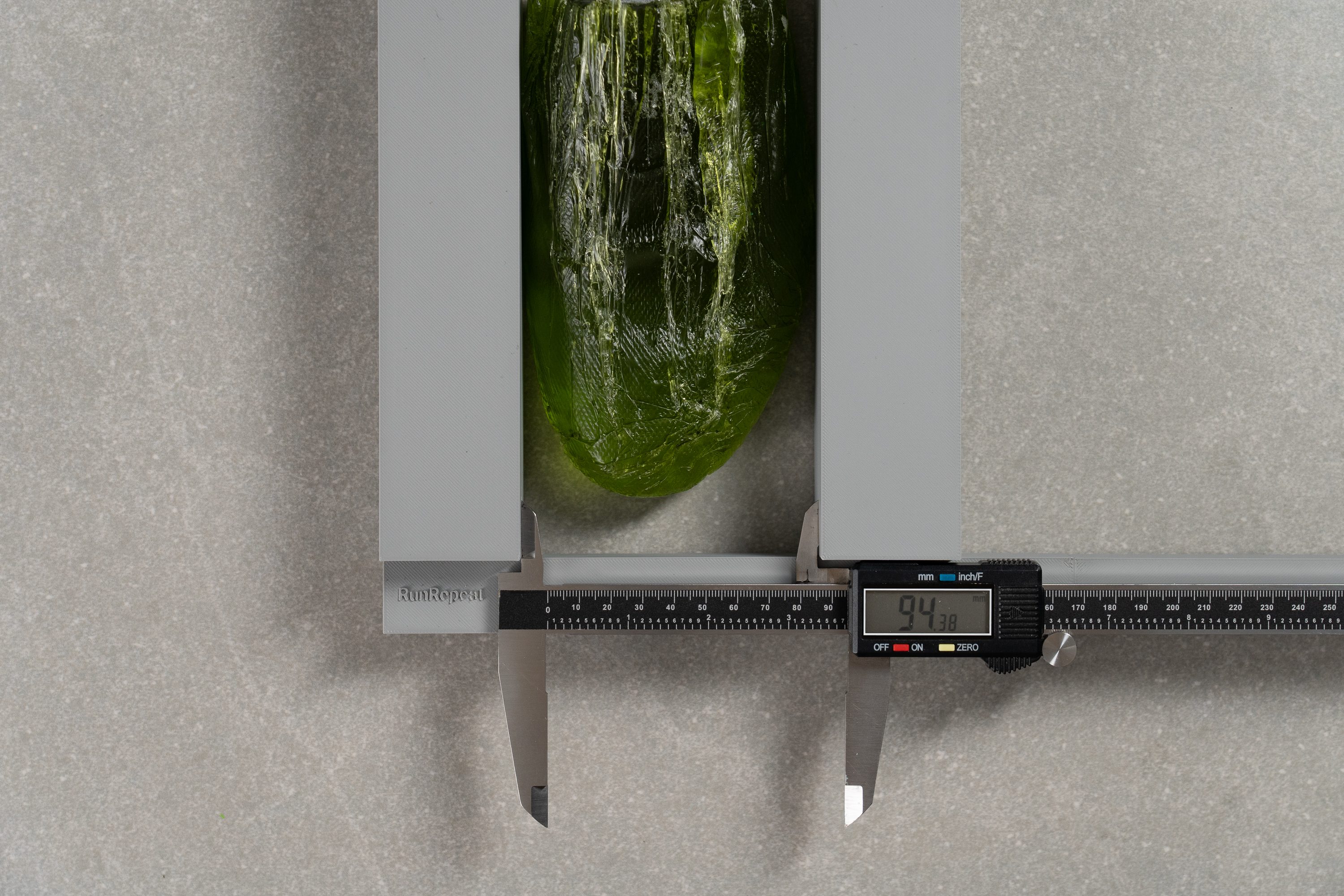
| Solematch Control | 94.4 mm |
| Average | 92.9 mm |
Toebox width
UpdatedThe Solematch Control also turned out to be adequately spacious around the toes. At the big toe mark, our caliper showed a standard width of 70.0 mm.
Players with medium-width feet can be sure that there is no pinching or toe squeezing in here!
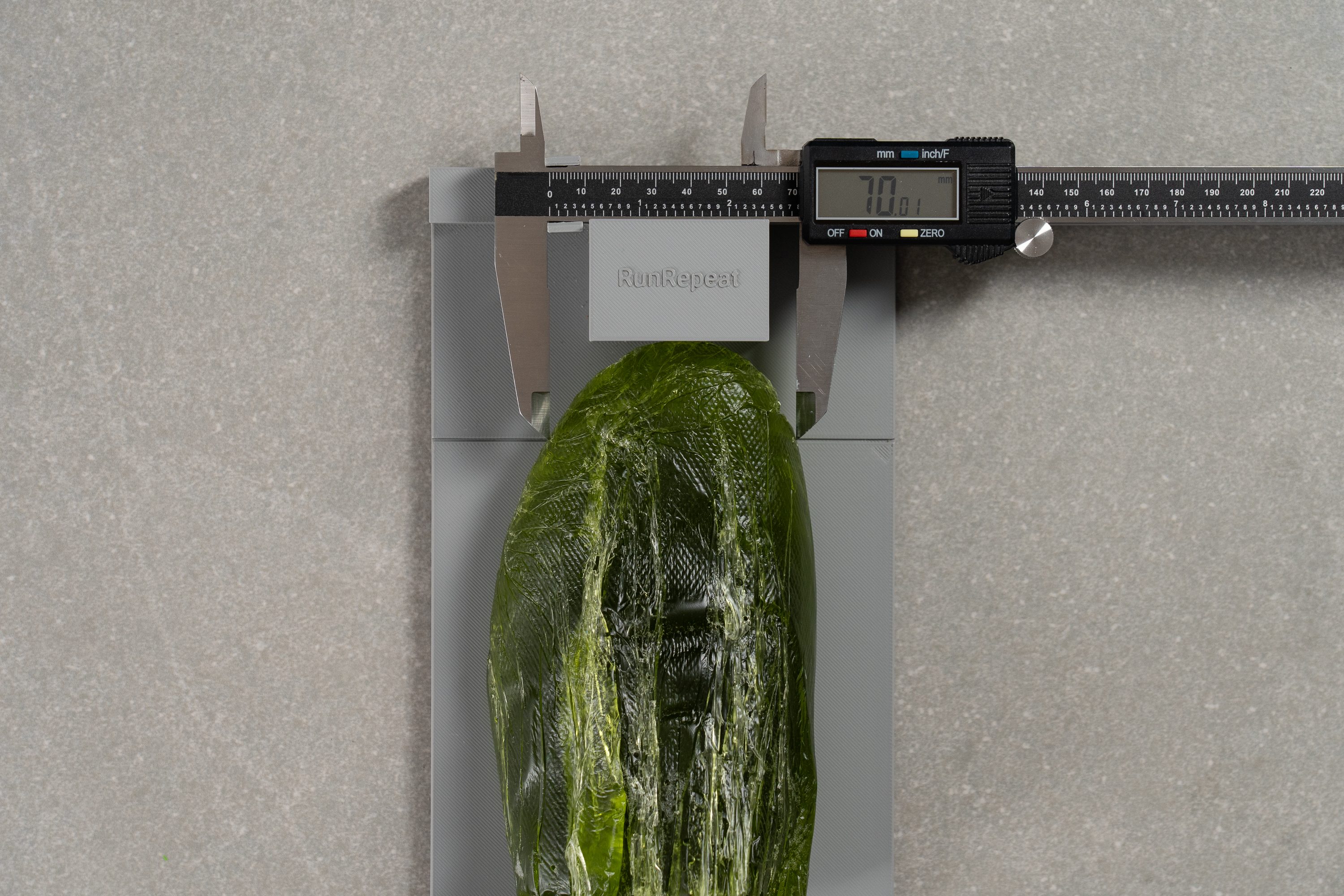
| Solematch Control | 70.0 mm |
| Average | 69.3 mm |
Toebox height
This Adidas shoe also treated our feet to an ample space above the toes. At 24.0 mm, it is very close to the category average.
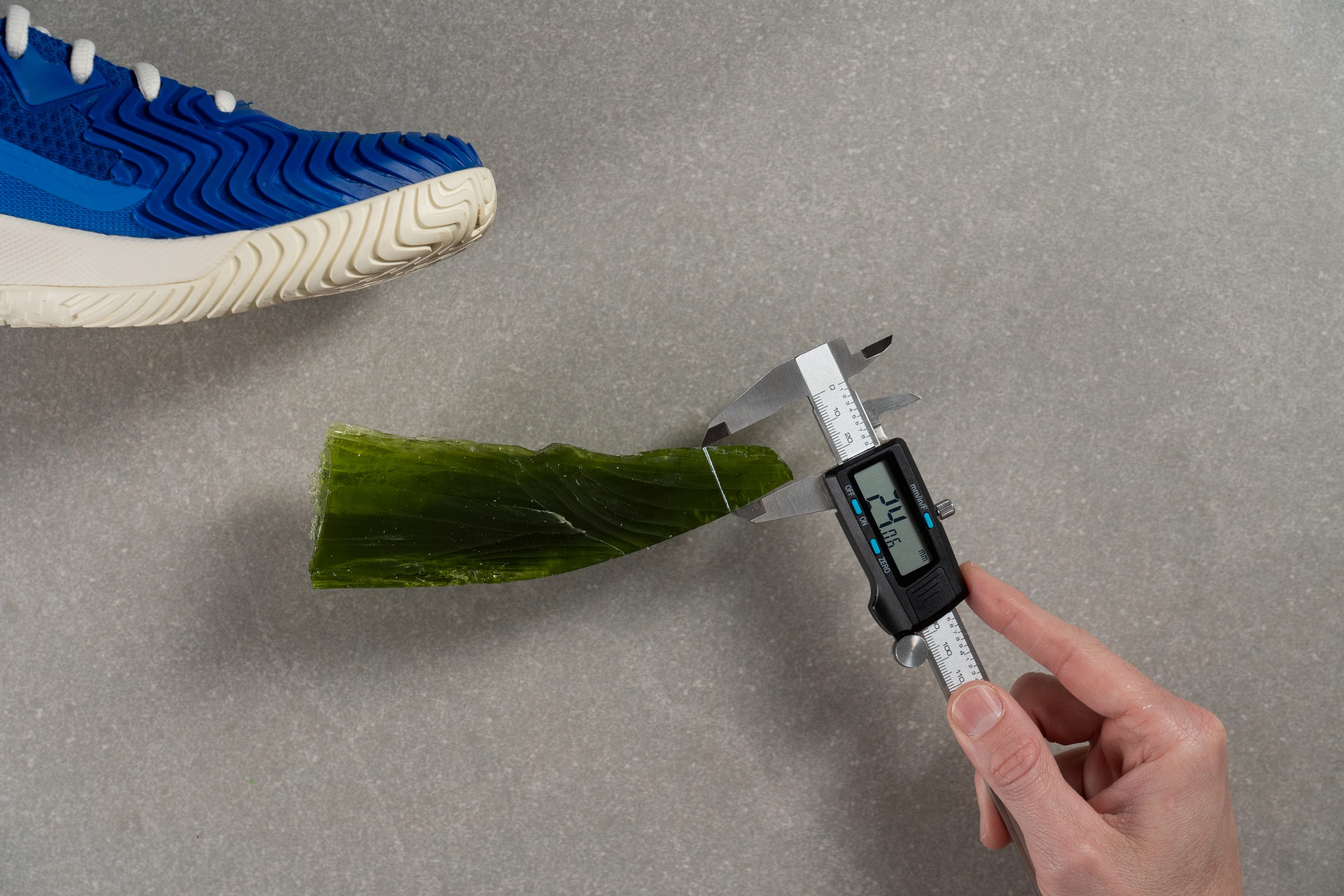
| Solematch Control | 24.0 mm |
| Average | 25.0 mm |
Traction / Grip
Forefoot traction
The Solematch Control turned out to be on the sticky side with its above-average friction coefficient of 0.83.
This Adidas shoe supports quick direction changes, hard stops, and push-offs brilliantly, reducing the risk of slipping on hard court.
| Solematch Control | 0.83 |
| Average | 0.73 |
Outsole design
Looking at the bottom of the SoleMatch Control, we can see deep undulating treadlines in the heel and forefoot areas where traction is needed the most. Meanwhile, the shoe's features a shallow and blocky pattern in the midfoot, promoting close connection to the court.
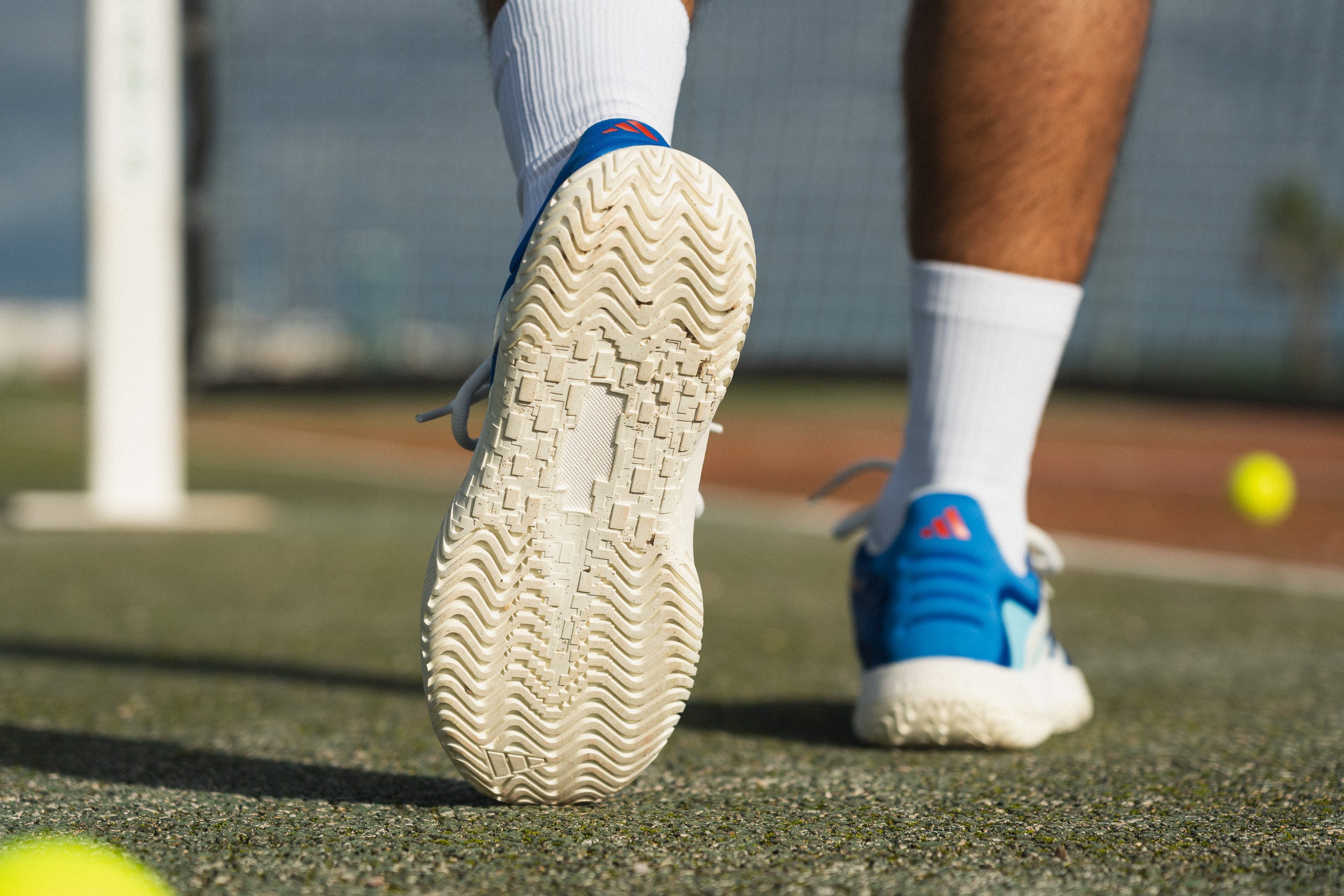
Flexibility / Stiffness
Given the absence of a shank, the Adidas SoleMatch Control gets to be lighter and also more flexible.
With the help of our shoe flexing tester, we determined that the SoleMatch Control is more flexible than the average tennis shoe. According to the machine, it takes 13.8N to bend this Adidas shoe to a 30-degree angle.
We cannot judge whether it's good or bad as it's a matter of personal preference. Some players do like the extra push-off provided by a stiff shank. And if that's you, we recommend the New Balance FuelCell 996 v5.
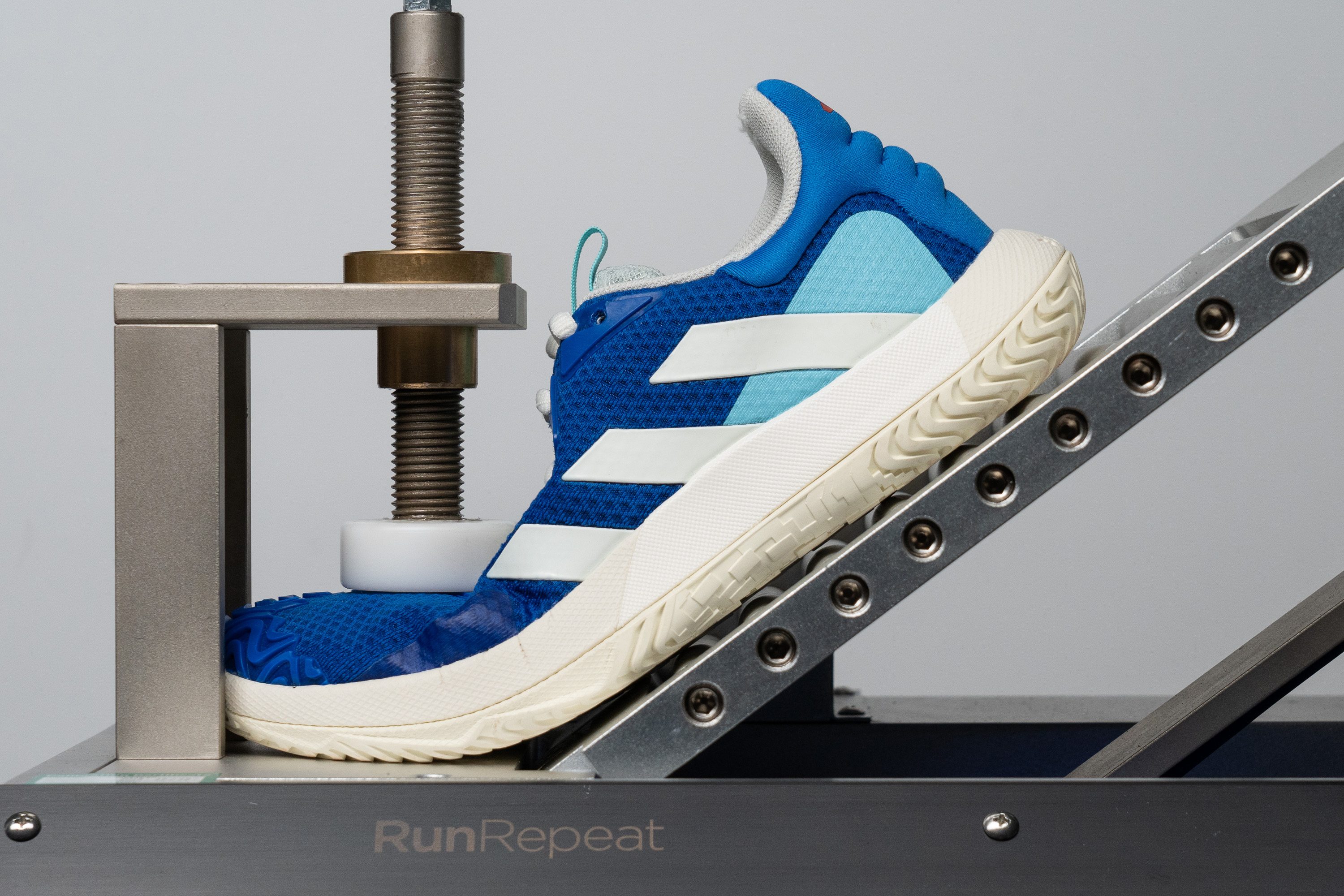
| Solematch Control | 13.8N |
| Average | 16.6N |
Weight
With the SoleMatch Control, you may not completely forget that you're wearing shoes but you are going to feel like floating for sure!
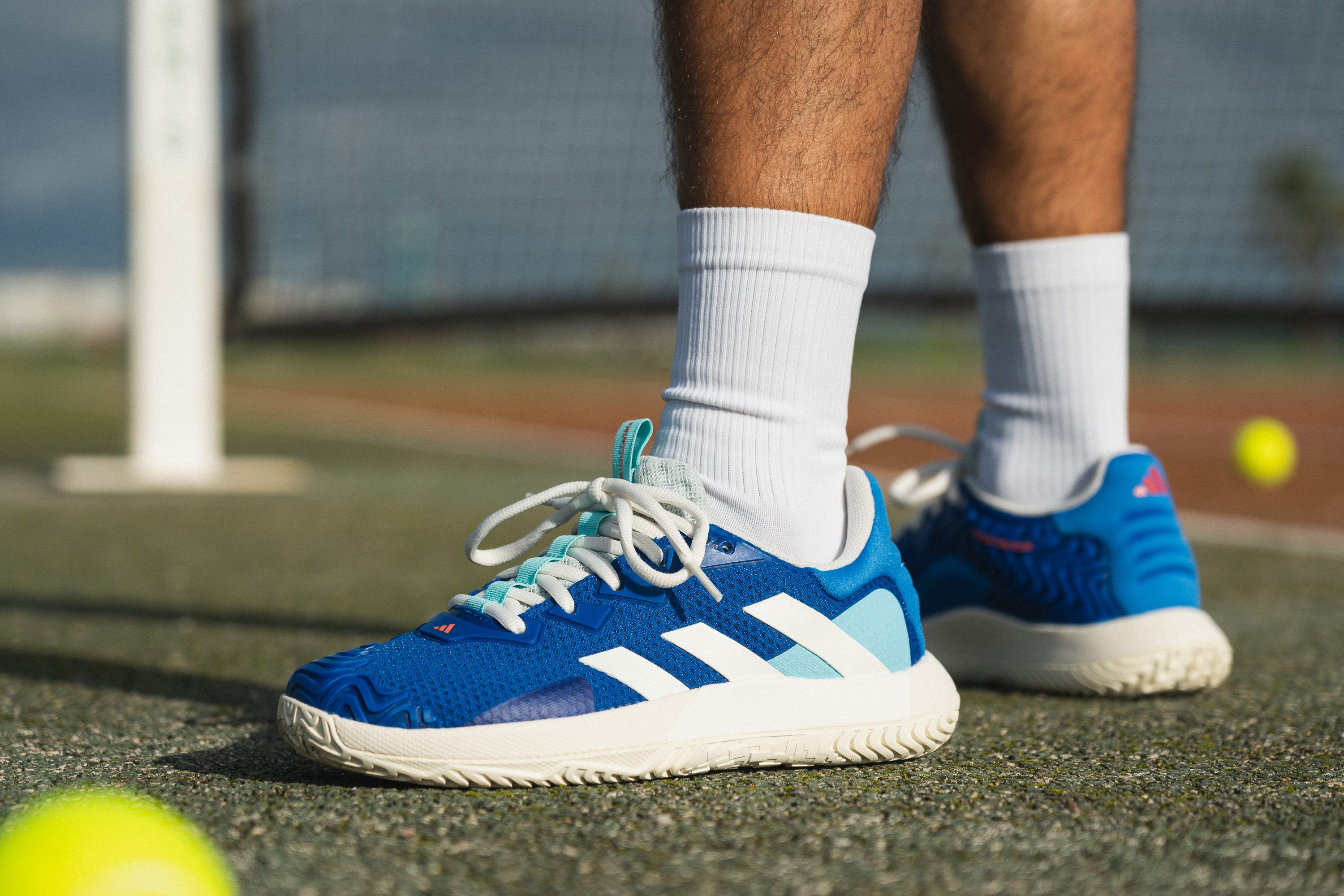
Putting this Adidas shoe on a scale in a men's US size 9, we got 12.1 oz (343g) which is lighter than the average. It is not the lightest tennis shoe on our roster but it is one that helped us accelerate with ease!
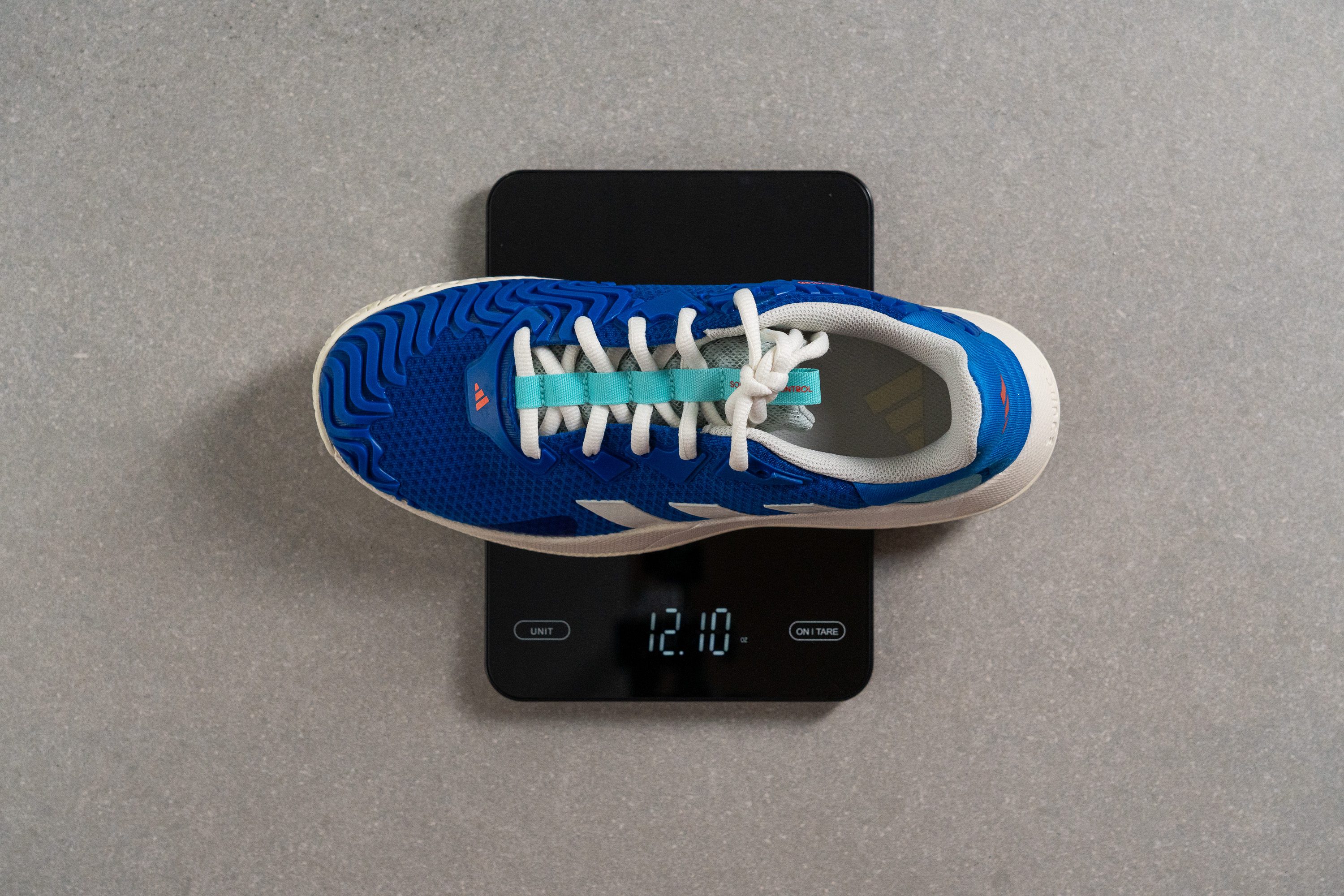
| Solematch Control | 12.1 oz (343g) |
| Average | 12.8 oz (364g) |
Breathability
Seeing how much protection Adidas placed on the upper of the SoleMatch Control, it was no surprise that this shoe lacked breathability.
Compared to the ASICS Solution Speed FF 2 (on the right), this Adidas shoe really falls short of proper ventilation for a summertime match.
In the video above, we pump smoke through the shoe's upper to check how well its upper material lets the heat escape. In comparison, it's easy to see how the SoleMatch Control is only letting a thin streak of air out and only through the tongue area. Because of that, this Adidas shoe loses breathability points, scoring only 3 out of 5.
What's more, hovering the shoe's half-cut upper over the light, we couldn't even see any ventilation holes! It is a very dense kind of fabric.
Even when zooming in on the textile through our microscope, we couldn't see the pores.
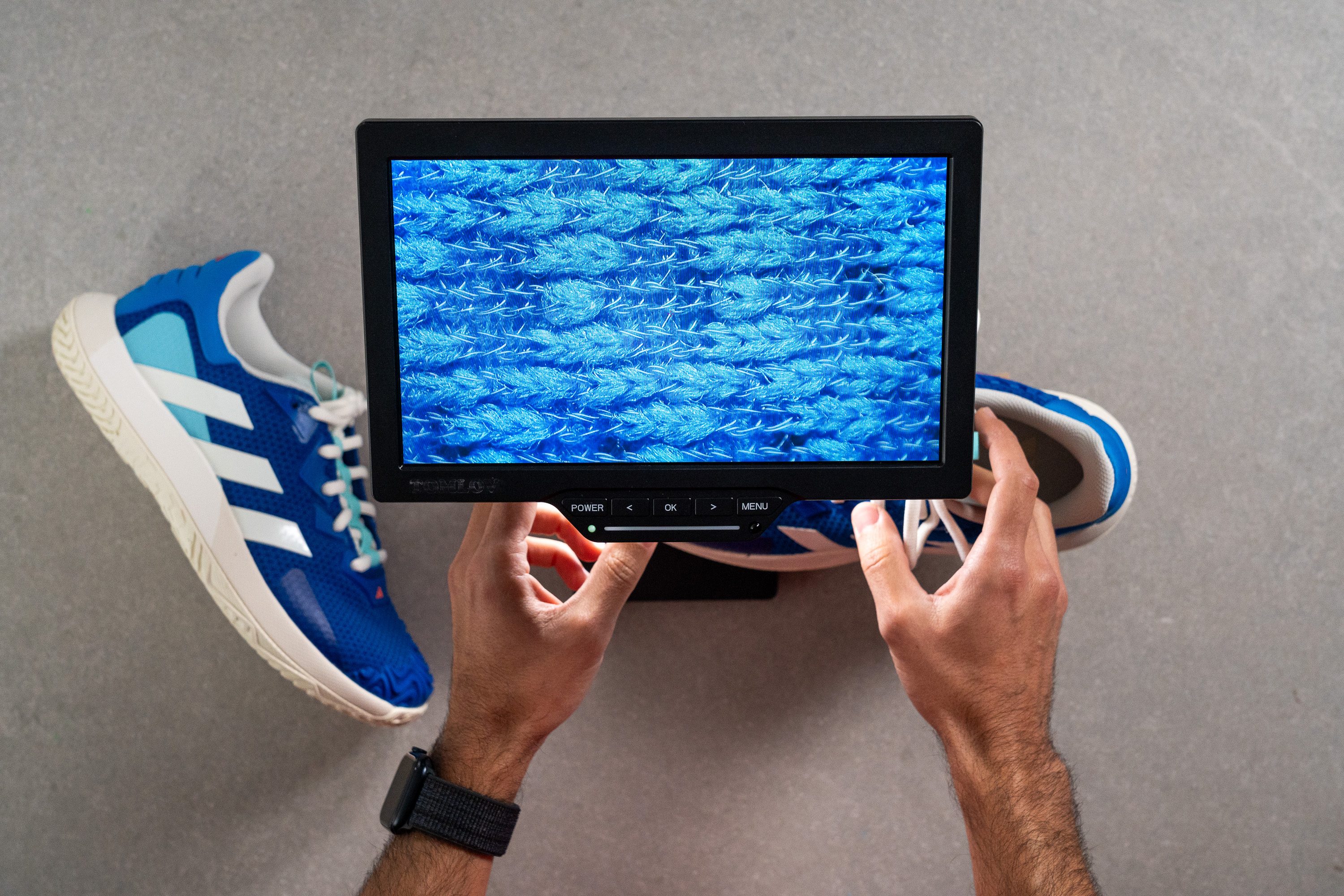
There is a mix of thinner and thicker threads but it doesn't help the shoe's ventilation capacity that much.
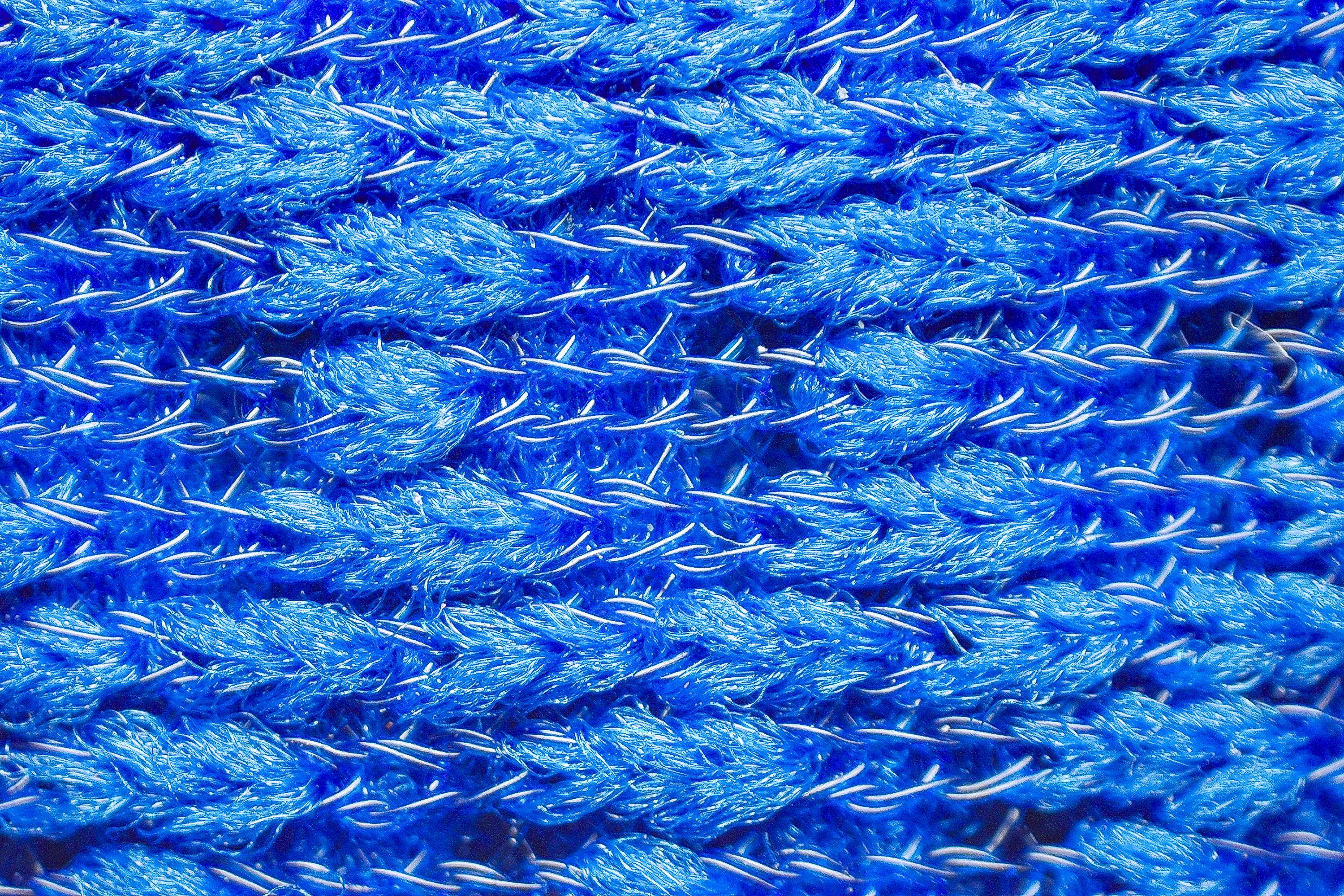
| Solematch Control | 3 |
| Average | 3.1 |
Stability
Lateral stability test
For a speed-oriented shoe, the Adidas SoleMatch Control made us feel very confident moving side to side. There is not a ton of support in the shoe's upper but its platform helped us feel surefooted and grounded on the court.
Torsional rigidity
We are utterly amazed at how this Adidas shoe gets to be so stiff without using a shank! It is only by means of a firm carrier foam and a slightly raised outsole rubber that the SoleMatch Control scored 5 out of 5 on our torsional stiffness test.
We never felt as though our ankles were about to roll over in this shoe.
| Solematch Control | 5 |
| Average | 4.5 |
Heel counter stiffness
According to Adidas, the shoe's heel is 3D-molded to provide a more secure foot containment. And from our own experience with the shoe, we can confirm that it's a true statement.
It may look soft on the outside but the shoe's heel counter has a lot of structure to it. Squeezing and pushing it in our manual test, we rated its stiffness as 4 out of 5. Nearly the maximum on our 1-5 scale!
| Solematch Control | 4 |
| Average | 4.1 |
Midsole width - forefoot
The shoe also granted extra lateral stability through its widened platform. Measuring the widest part of its forefoot, our caliper showed 116.7 mm. That's surprisingly wide, especially given that Adidas' stability-oriented Barricade 13 comes in at 111.9 mm.
But pushing off a wide area like that made us feel quite confident on extreme lateral movements.
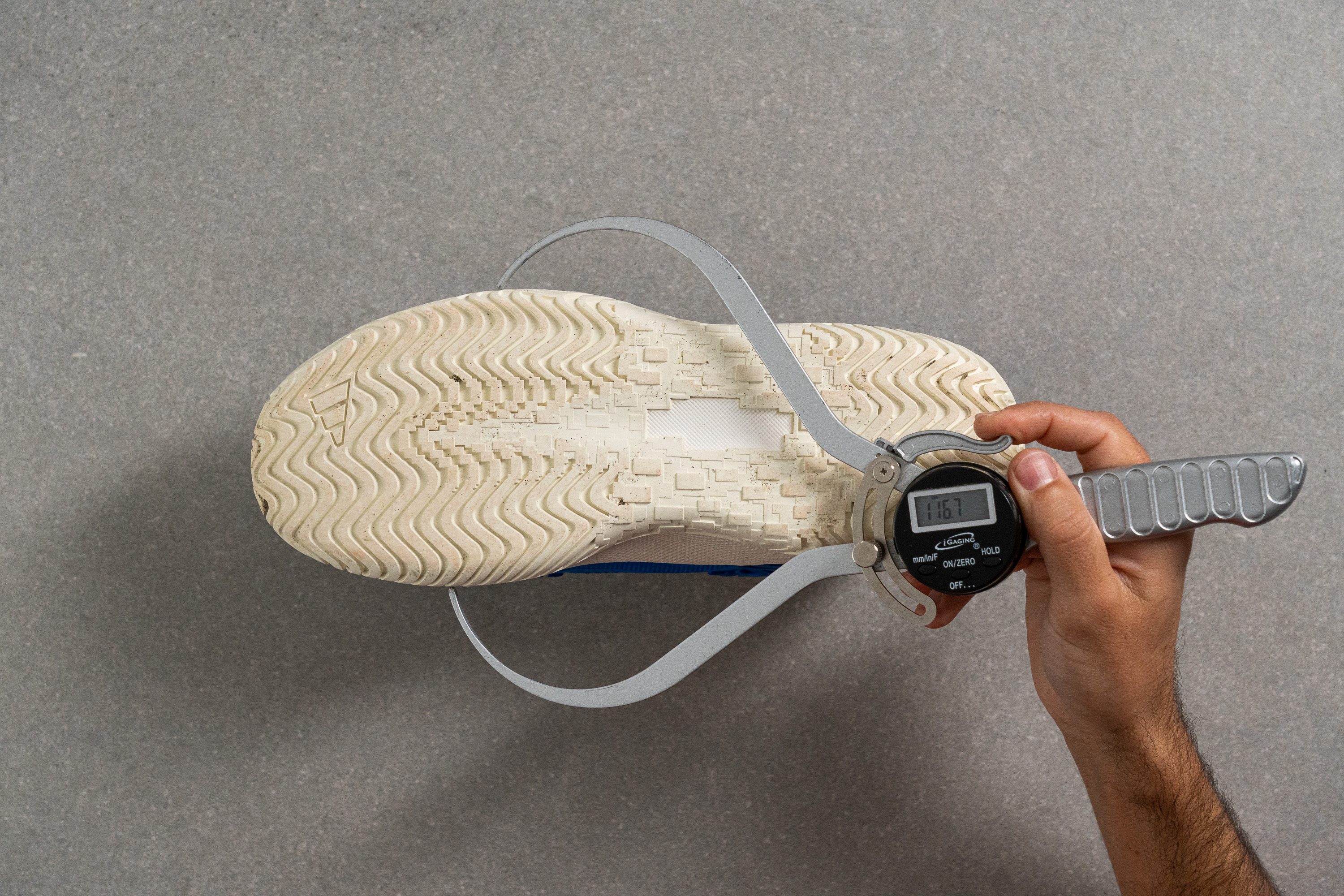
| Solematch Control | 116.7 mm |
| Average | 112.0 mm |
Midsole width - heel
As for the shoe's heel, it didn't stand out as particularly wide. With a caliper measurement of 90.3 mm, it is just about the same as the average. But it's nota bad thing at all!
For tennis shoes, a wider forefoot is more important for controlling foot movements.
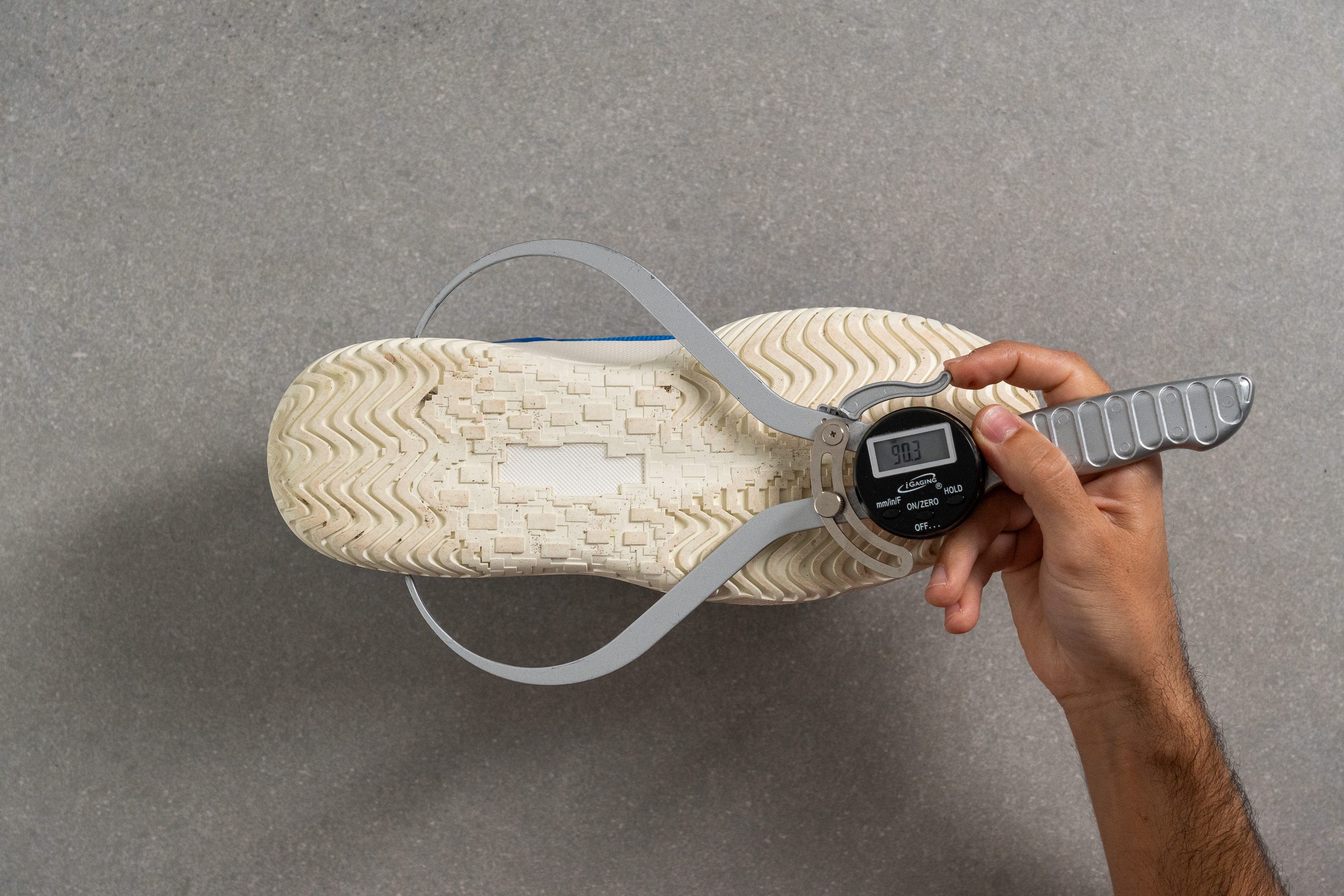
| Solematch Control | 90.3 mm |
| Average | 89.8 mm |
Durability
Toebox durability
This has got to be one of the most reinforced toeboxes we've seen in tennis shoes! Adidas went full-force with the Adituff overlays to protect this area from toe drags.
But what's the quickest way to test toebox durability without logging hours on the court? Bring in the Dremel!
Setting the tool's speed to 5K RPM, we held it against the same spot on the shoe's toebox for 12 seconds. For consistency of results, we always apply the same pressure (3.2N) to all tested shoes.
Do we have to say that we were flabbergasted when the sandpaper tip only went halfway through the toecap? That's an amazingly good result, especially for a shoe in this weight and price class.
On a durability scale from 1 to 5, we gave the shoe's toebox durability a solid 5 out of 5.
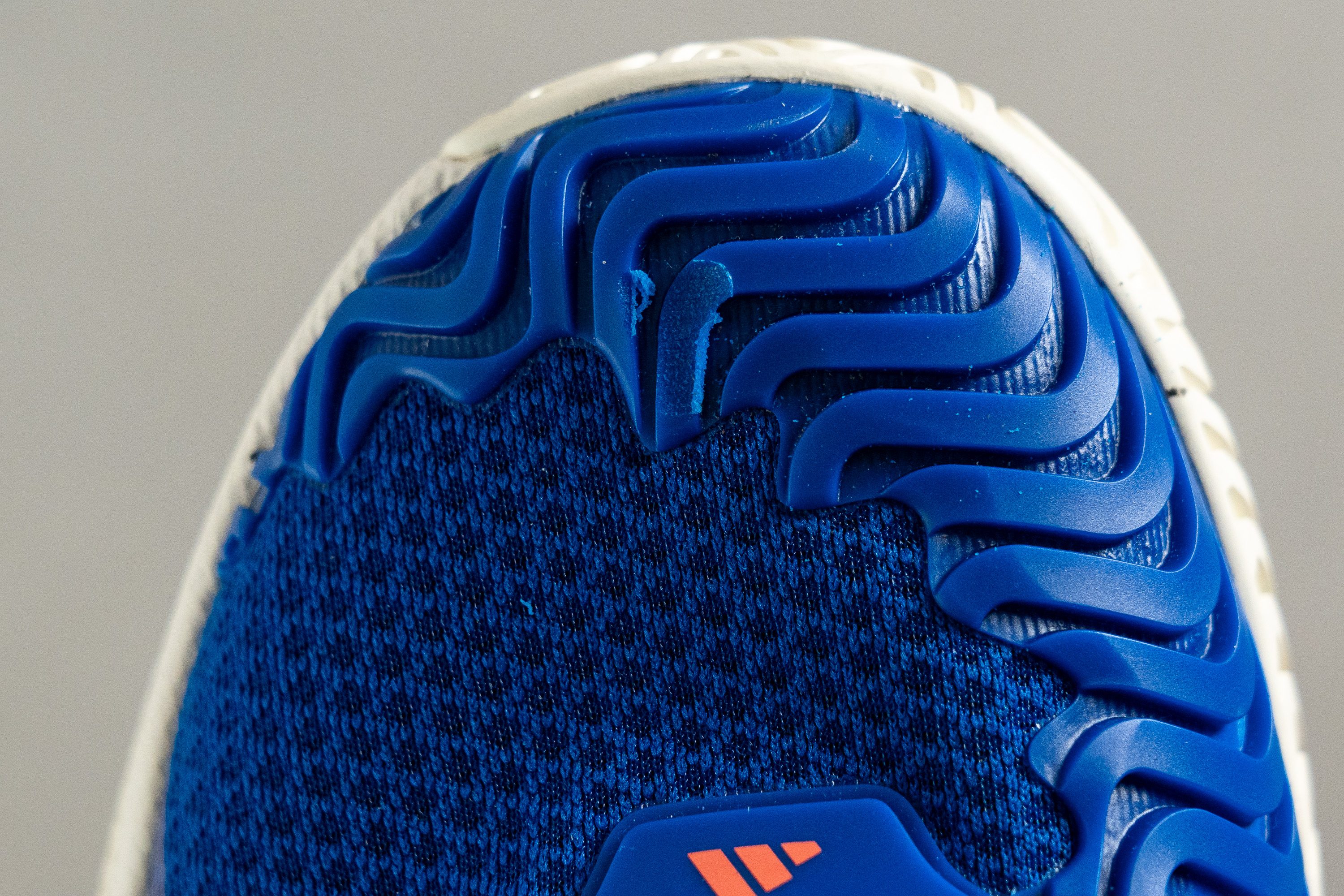
| Solematch Control | 5 |
| Average | 3.7 |
Heel padding durability
As for the shoe's interior mesh lining, it turned out to be not so abrasion-resistant. It took our Dremel as little as 4 seconds to tear a notable hole in this part of the upper.
On a 1-5 scale, we assessed it as little as 2. And that's when most tennis shoes average at 3.
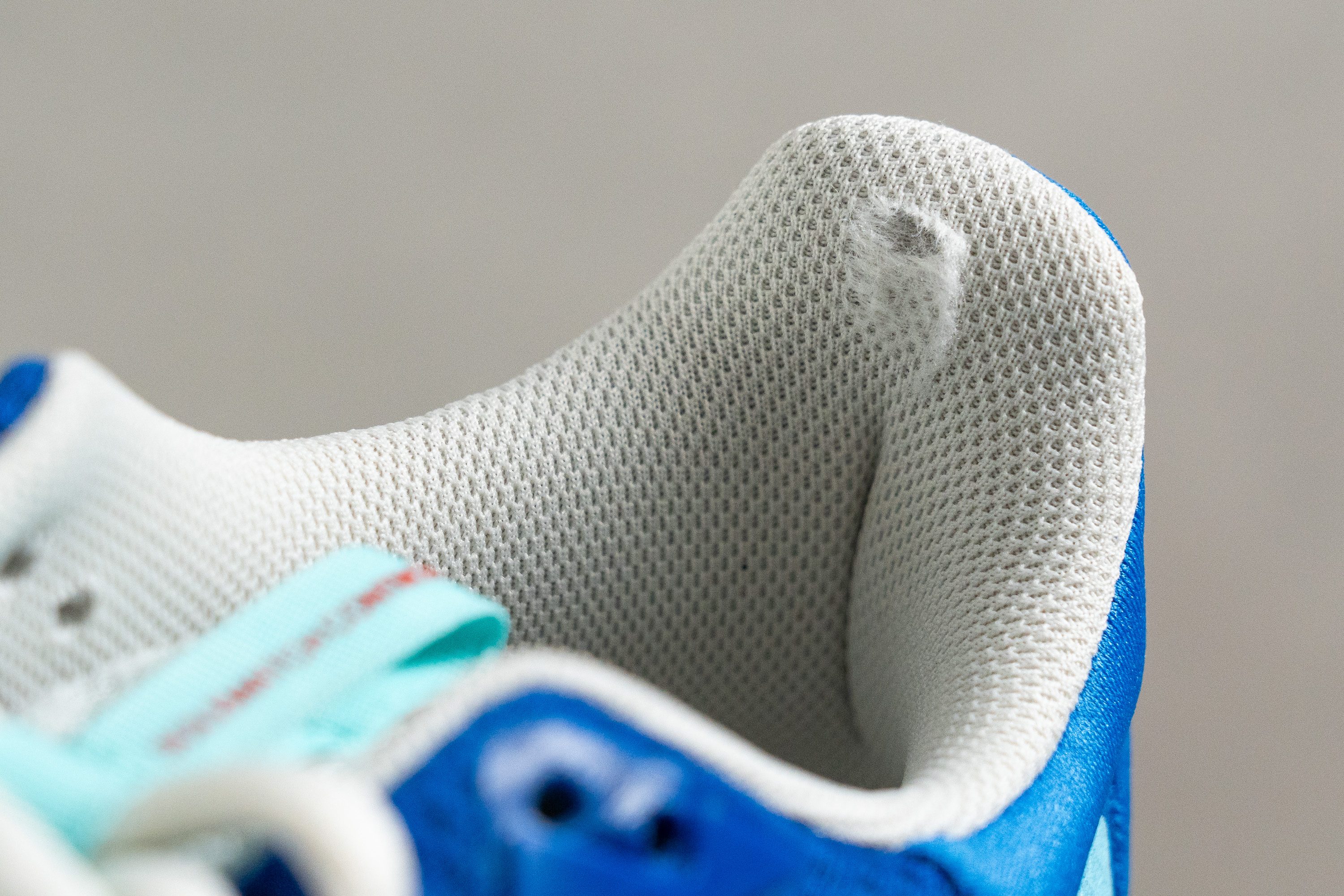
| Solematch Control | 2 |
| Average | 3.3 |
Outsole hardness
But it seems like the inner lining is the only frail part of the Adidas SoleMatch Control. Because based on our wear tests, the outsole of this shoe was made to last!
First of all, it is among the firmest rubbers we've recorded in our lab. Pressing a durometer against it, it showed 88.0 HC which is among the top 5 tennis shoe outsoles based on hardness. And that's always a good sign when it comes to durability.
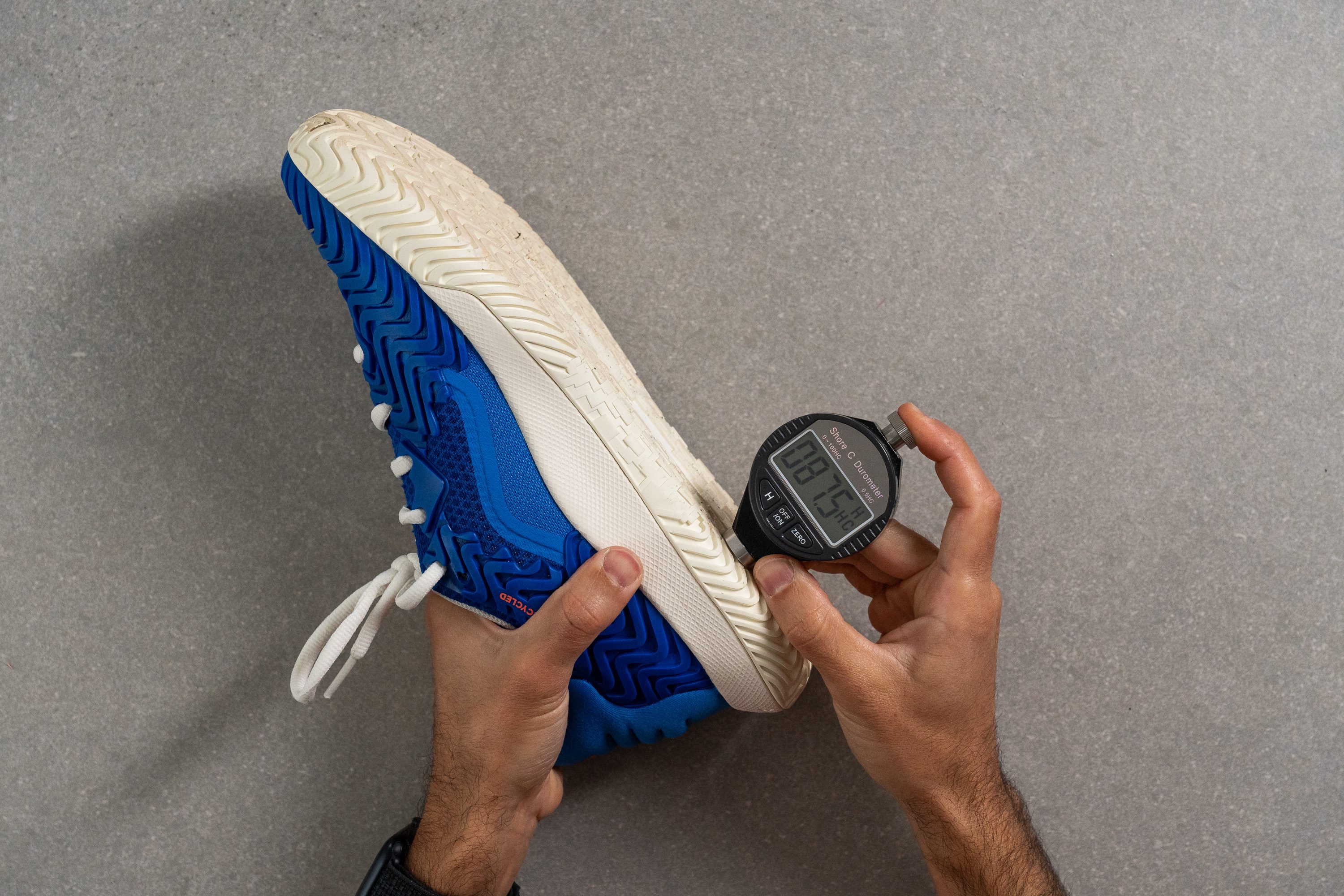
| Solematch Control | 88.0 HC |
| Average | 86.0 HC |
Outsole durability
To back up our findings above, we turned up the Dremel speed to 10K RPM and drilled the rubber in the same spot for as long as 22 seconds.
Considering the shoe's moderate price tag, the result was a very pleasant surprise! Our tread gauge showed that the sandpaper tip only cut through the rubber by 0.6 mm. That's the same result we got in much pricier tennis shoes.
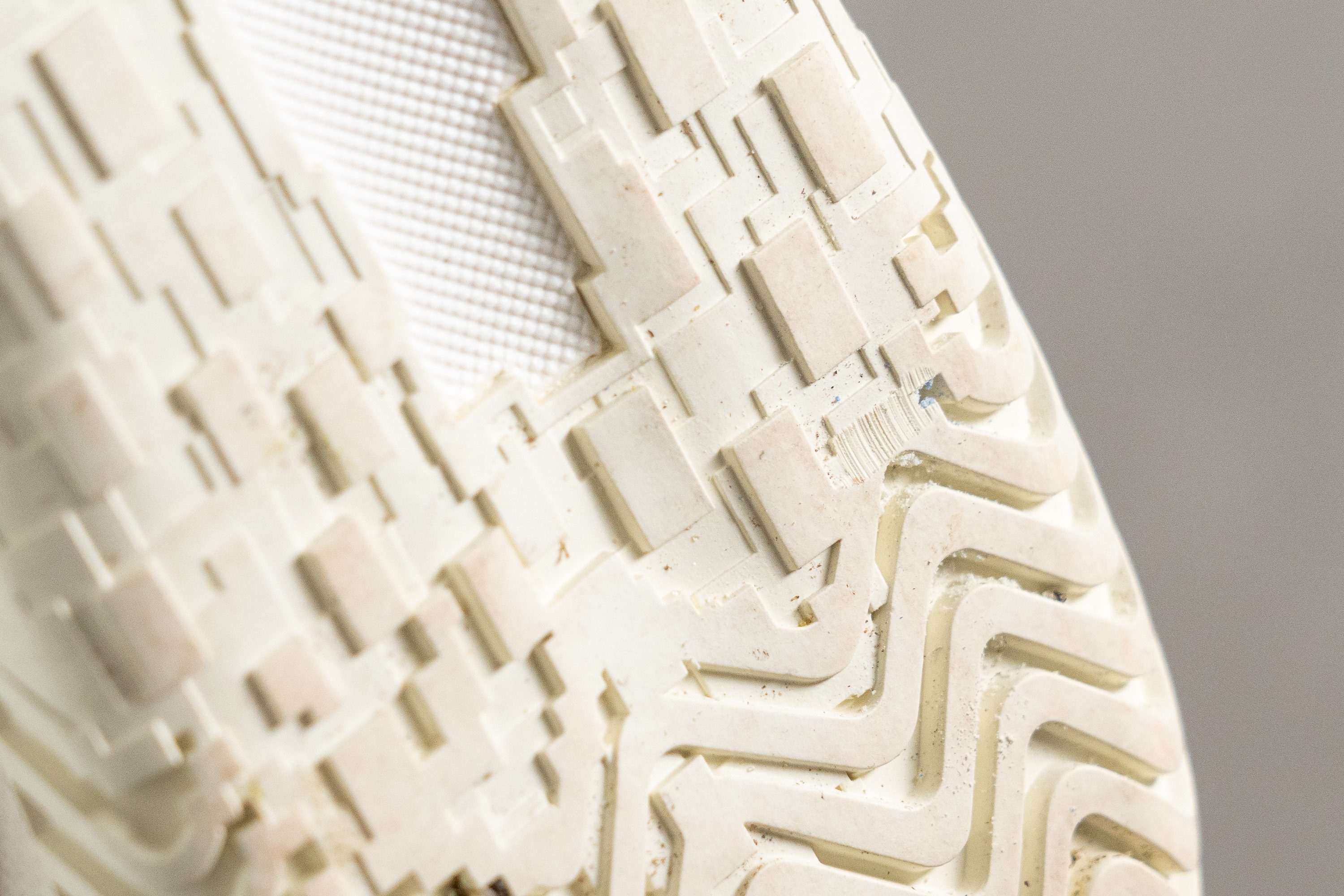
| Solematch Control | 0.6 mm |
| Average | 0.7 mm |
Outsole thickness
Measuring the outsole thickness of this Adidas tennis shoe, we got 3.7 mm on the caliper. Even though it is slightly thinner than average, we have no serious concerns about the longevity of this component given its hardness and resistance to abrasion.
But do keep in mind that there is no outsole warranty for the SoleMatch Control unlike in some other tennis shoes.
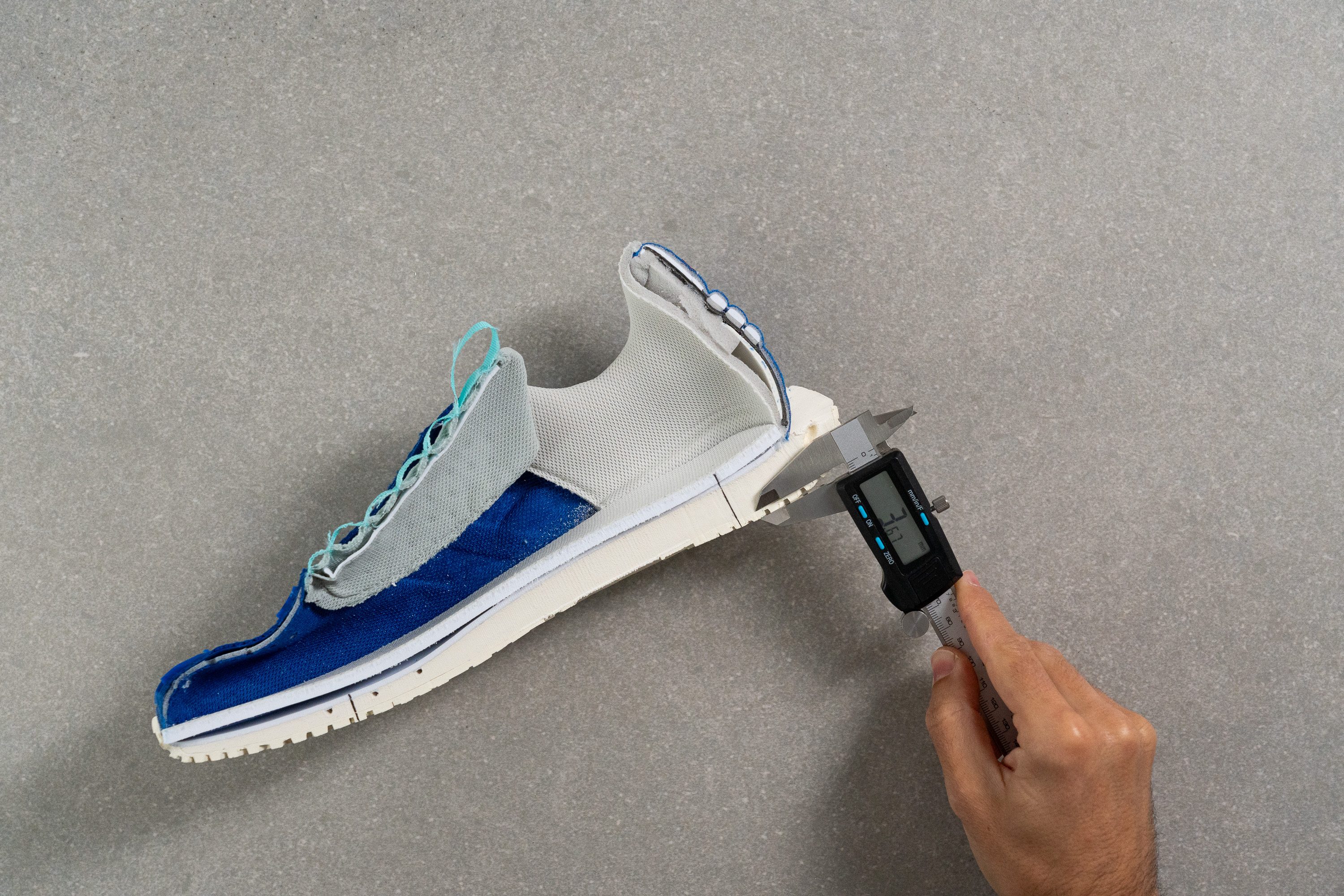
| Solematch Control | 3.7 mm |
| Average | 4.2 mm |
Misc
Insole thickness
Complementing the Bounce foam is a well-padded 5.0-mm thick insole. It is not the thickest, based on our caliper measurements, but it offers plenty of comfort for sure.
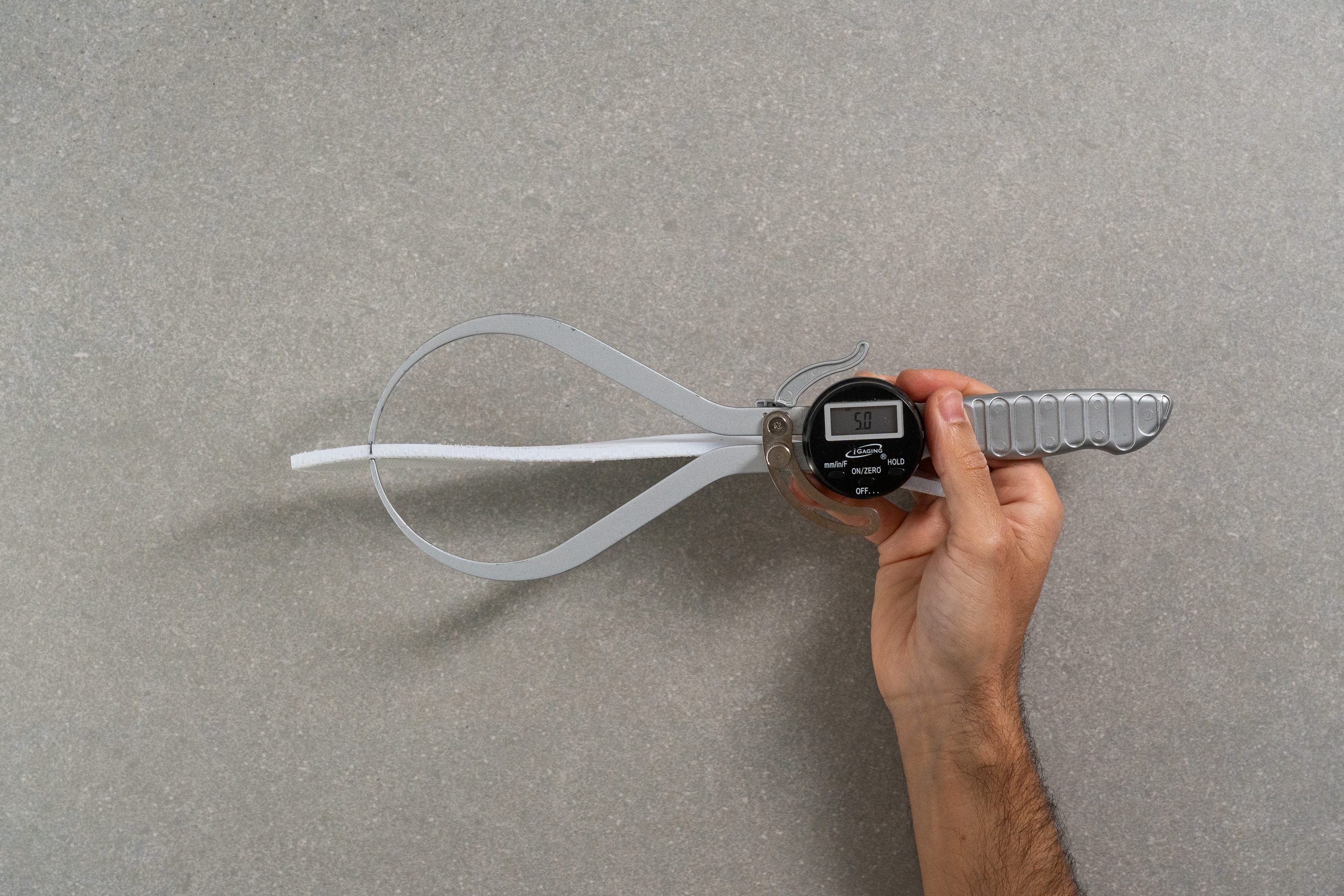
| Solematch Control | 5.0 mm |
| Average | 5.1 mm |
Removable insole
Ir your feel crave that added padding or customized support, it is easy to remove and replace the shoe's stock insole.
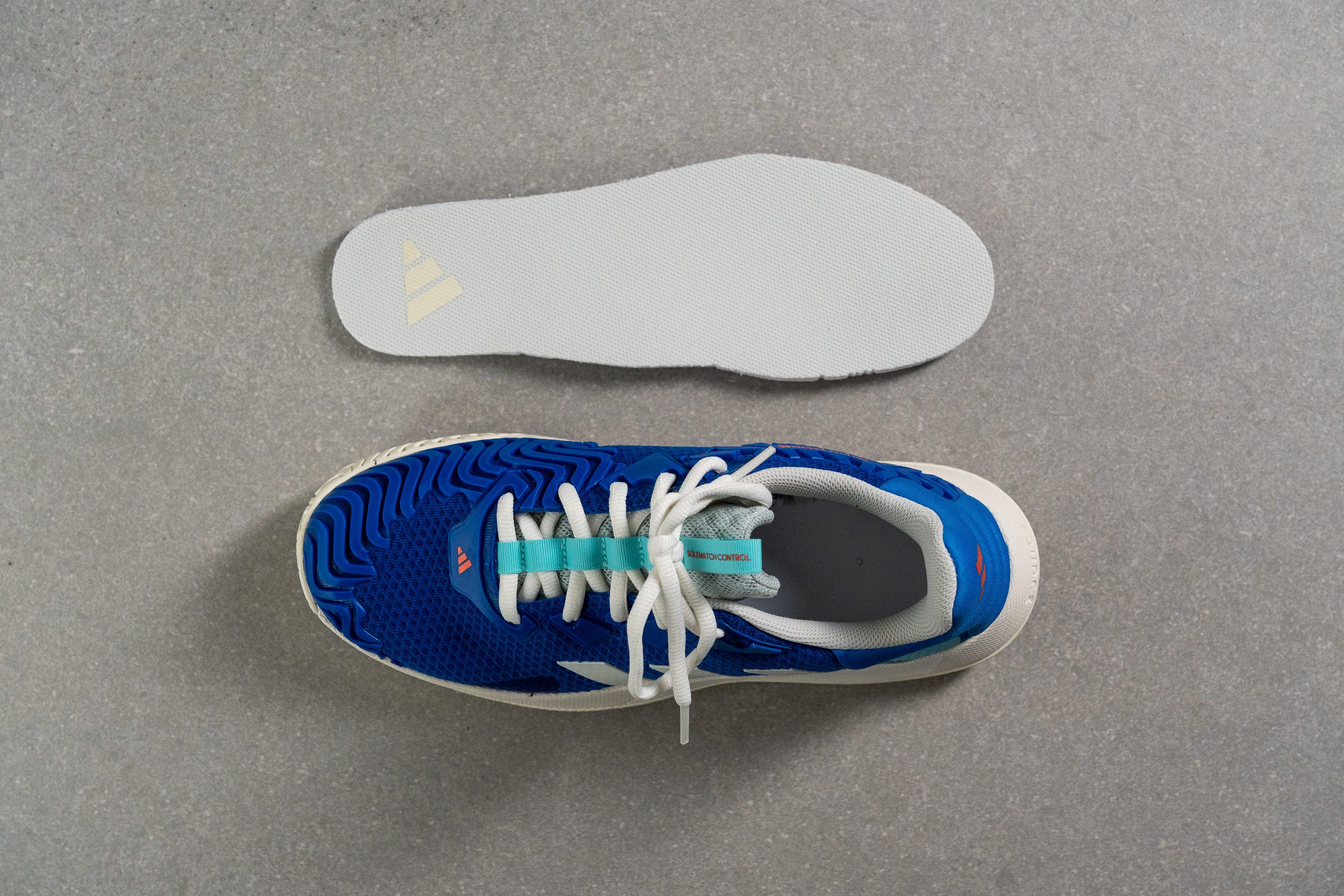
| Solematch Control | Yes |
Tongue padding
One of the ways in which this tennis shoe saves weight is by cutting corners on the in-shoe padding. There is just enough of it around the collar for heel hold and comfort but the rest of the upper remains sock-like thin.
The tongue in particular is only 3.1 mm thick, based on our caliper. This is a few millimeters less than average.
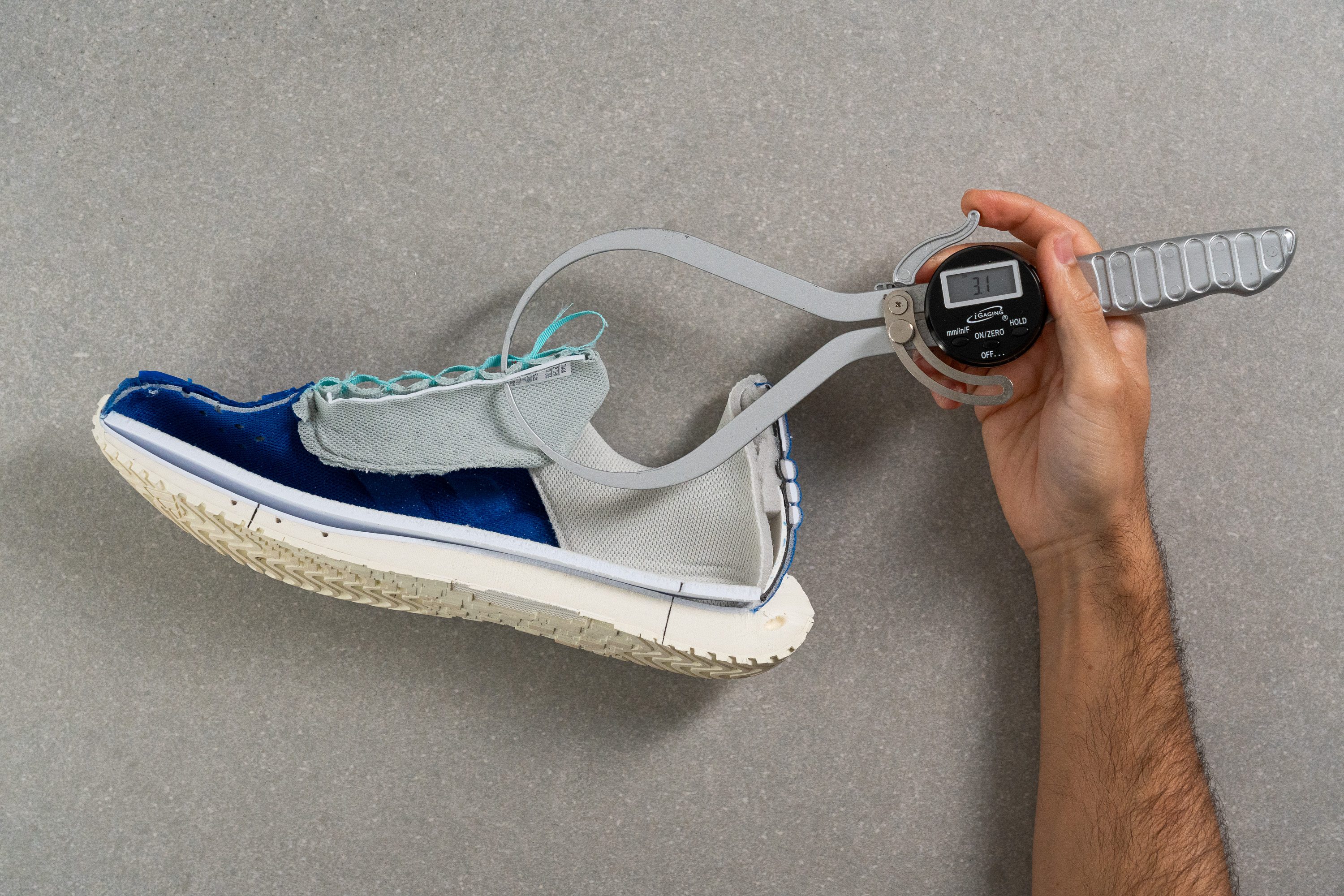
| Solematch Control | 3.1 mm |
| Average | 8.2 mm |
Tongue: gusset type
There are no gussets on the tongue of this Adidas shoe. But there are multiple fabric loops for the laces to go through and prevent unwanted tongue sliding.
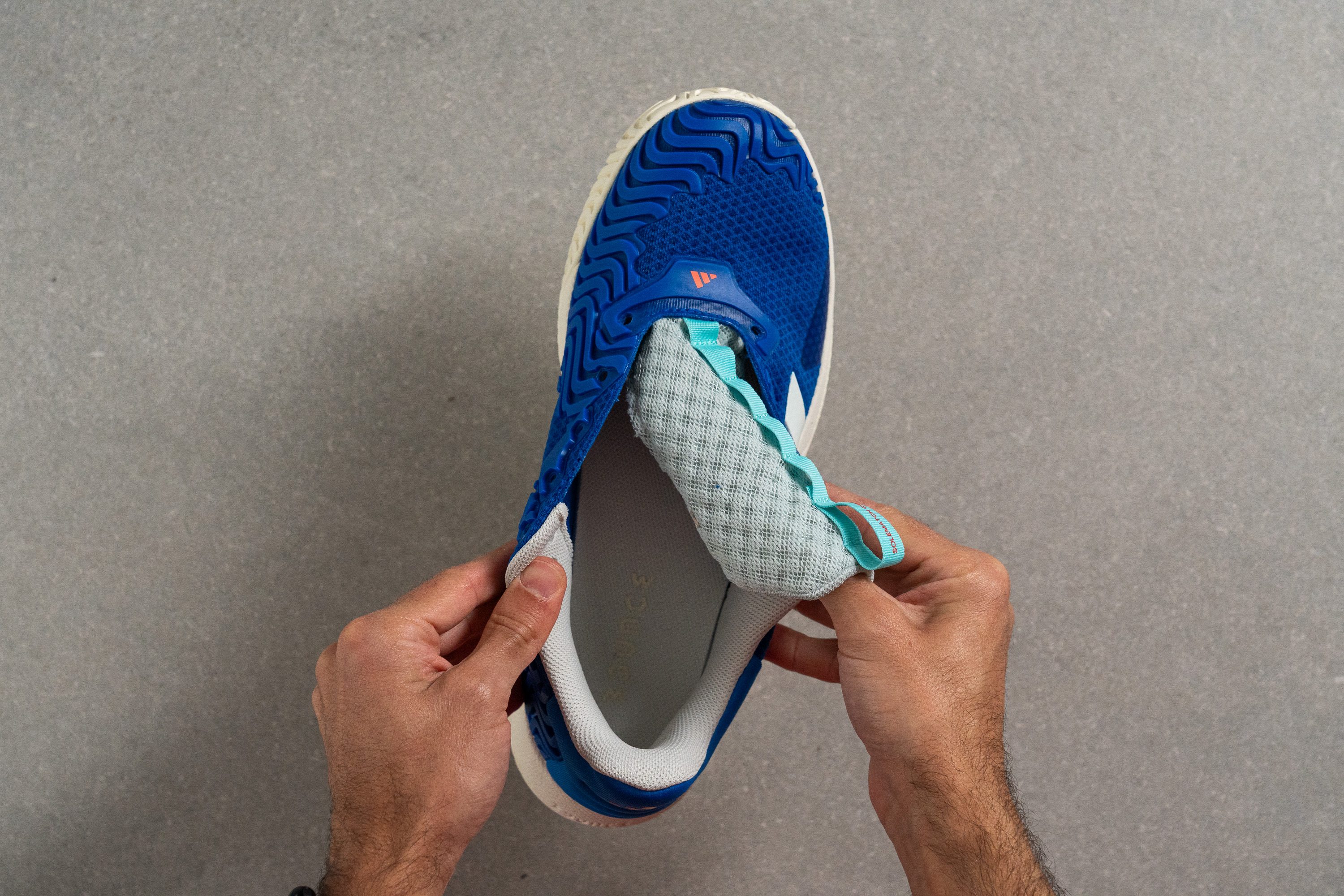
| Solematch Control | None |
Heel tab
There is no pull tab at the back of the shoe. However, it sufficed to grab the back of the collar and the finger loop on the tongue to get the SoleMatch Control on effortlessly.
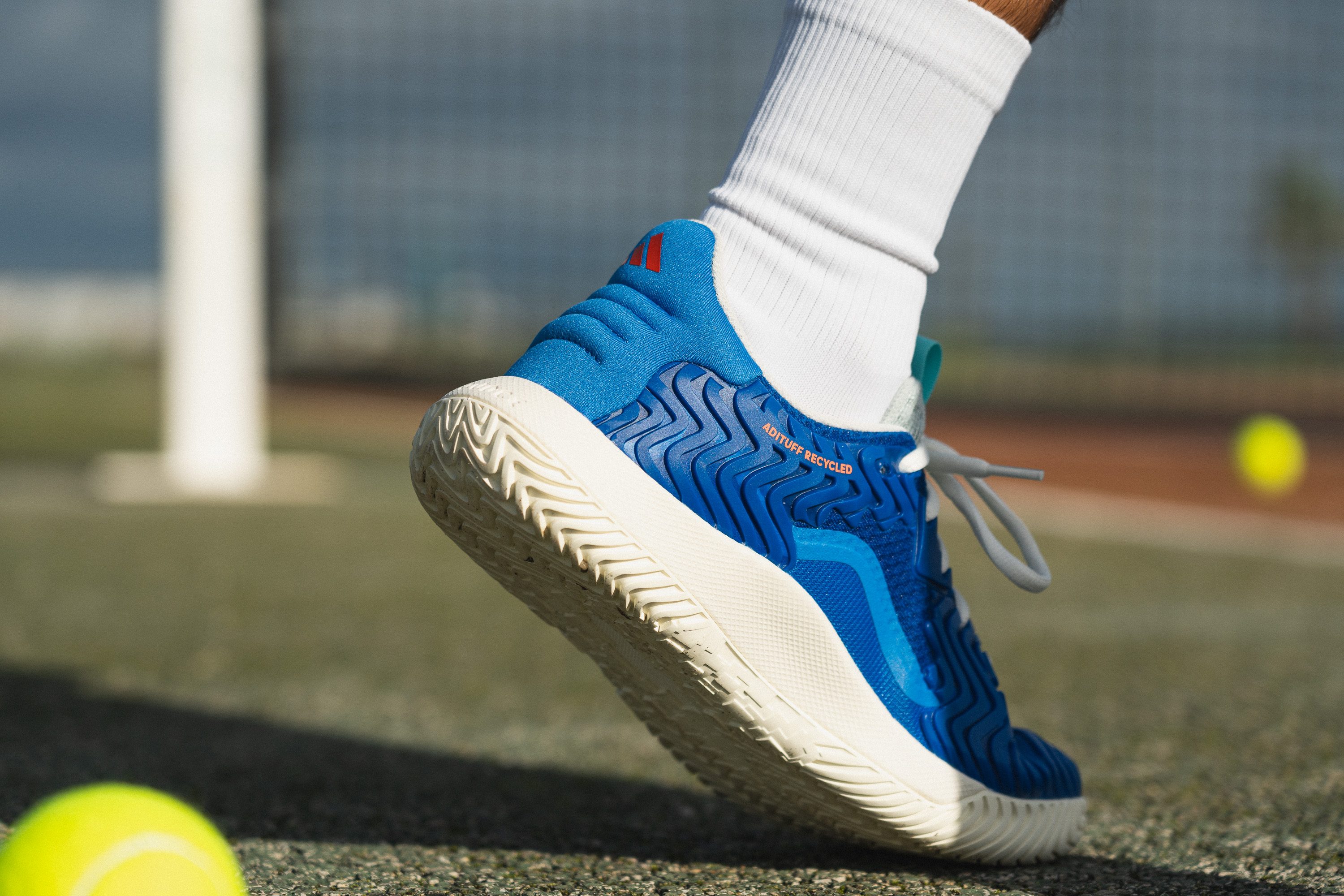
| Solematch Control | None |

